
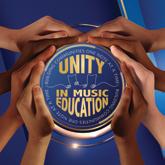
October 2022 1 Essential Jazz Pedagogies and ResourcesTrauma’s Influence on Life: The Importance of Trauma-Informed Pedagogy PLUS: The Media’s Influence onOurPerceptions ofPeopleWithDisabilities CONFERENCE Singing as a Life-Long Educational Endeavor Research Bridging the Divide From Childhood to Adulthood
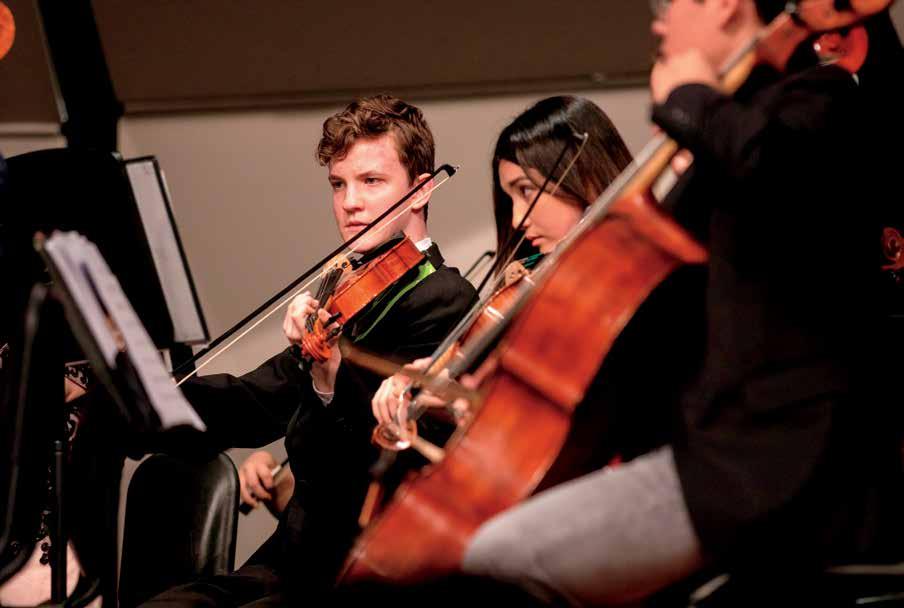
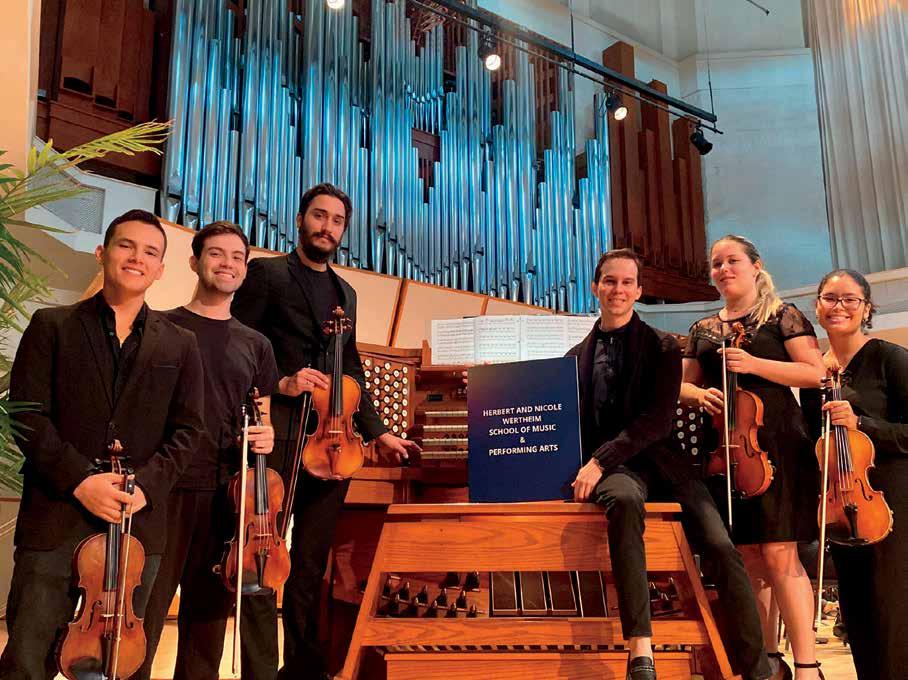
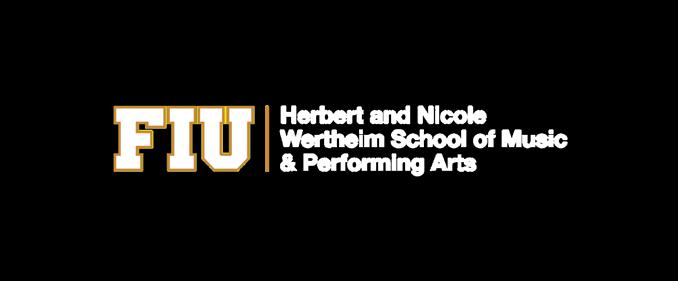
2 Florida Music Director AUDITION DATES 2022-2023 November 19 | February 4 | March 18 Additional dates are available by appointment. Graduate assistantships are available. Undergraduate Degrees (B.M.) Instrumental Performance | Jazz Performance Music Business | Music Composition | Music Education Music Technology | Musical Theatre | Organ Performance Piano Performance | Vocal Performance Graduate Degrees (M.S.) Music Education - Traditional & Certification Tracks 4 + 1 Track (B.M + M.M.) Vocal Performance | Composition | Musical Theatre LIV Graduate Degrees (M.M.) Conducting | Instrumental Performance Jazz Performance | Music Composition Music Management & Production Music Technology | Musical Theatre Organ Performance | Piano Performance Vocal Performance Wertheim School of Music & Performing Arts at Florida International University 10910 SW 17th St., Miami, FL 33199 | (305) 348-2896 | music@fiu.edu | music.fiu.edu Conservatory-Style Training at a Research I University
Executive Director

Florida Music Education Association


Kathleen D. Sanz, PhD Hinckley Center for Fine Arts Education
402 Office Plaza Tallahassee, FL 32301 (850) 878-6844 or (800) 301-3632 (kdsanz@fmea.org)
Editor-in-Chief
D. Gregory Springer, PhD
Florida State University College of Music
122 N. Copeland Street Tallahassee, FL 32306 (850) 644-2925 (office) (dgspringer@fsu.edu)
Editorial Committee
Terice Allen
(850) 245-8700, Tallahassee (tallen1962@hotmail.com)
Judy Arthur, PhD
Florida State University, KMU 222 (850) 644-3005 (jrarthur@fsu.edu)
William Bauer, PhD University of Florida, Gainesville (352) 273-3182; (wbauer@ufl.edu)
Alice-Ann Darrow, PhD College of Music, FSU, Tallahassee (850) 645-1438; (aadarrow@fsu.edu)
Jeanne Reynolds (jeannewrey@gmail.com)
John K. Southall, PhD
Indian River State College, Fort Pierce (772) 462-7810; (johnsouthall@fmea.org)
Advertising Sales
Valeria Anderson (val@fmea.org)
402 Office Plaza Tallahassee, FL 32301 (850) 878-6844
Official FMEA and FMD Photographers
Bob O’Lary Debby Stubing
Art Director & Production Manager
Lori Danello Roberts LDR Design Inc. (lori@flmusiced.org)
Circulation & Copy Manager
Valeria Anderson, (800) 301-3632
Copy Editor Susan Trainor
PRELUDE TO THE CONFERENCE
FEATURES C ontents October 2022 Volume 76 • Number 3 President’s Message ......... 4 Advertiser Index 5 Advocacy Report ........... 6 Academic Partners 29 2022-2023 FMEA Donors .. 38-39 Component News 40 Corporate Partners ......... 45 Committee Reports 46 Research Puzzles .......... 52 Executive Director’s Notes 54 Officers and Directors ....... 55
Pre-Conference....................... 9 Welcome ......................... 10 Important Dates ..................... 11 Registration ..................... 12-13 Contracted Hotels .................. 14-15 Personal Health and Safety ............... 16 Concert Tickets ..................... 17 All-State Rehearsal Locations .............. 18 Student Experiences ................... 21 Pilot Program ...................... 22 3K Run & Walk ..................... 23 Trauma’s Influence on Life: The Importance of Trauma-Informed Pedagogy ... 24 Essential Jazz Pedagogies and Resources .... 30 Singing as a Life-Long Educational Endeavor Research Bridging the Divide From Childhood to Adulthood ............. 34 DEPARTMENTS October 2022 3
Success in Everyone’s Community
Greetings, colleagues!
I trust that each of you has settled down at your respective school site and classroom. As we continue to establish our daily, weekly, monthly, and yearly goals, it is imperative that we think about meeting our students where they are in music while also uplifting their spirits by providing opportunities for them to grow. First and foremost, music teachers want their students to succeed in their class rooms across our various communities and districts. We can help promote this success by having classrooms with the resources to support a socially and cul turally diverse student population, ulti mately exposing students to diverse ideas, world views, and peoples as a means of enhancing learning and imbuing the classroom with relevance.
As professional musicians, we must take into account the significance of the different experiences and circumstances of our personal education and develop ment. We clearly understand that the suc cessful music teachers are those who are passionate about teaching. They “drive the bus,” no matter what challenges or adversities they encounter. Research has shown that positive reinforcement is far more effective than negative reinforce ment. For our music students to develop self-worth, musicianship, esprit de corps, integrity, and compassion, they must receive positive motivation from their teachers. Therefore, if music educators are interested in teaching ALL children, then they must provide favorable learn ing environments that will meet ALL students’ needs.
The objectives of music classes should be to motivate students, organize cur riculum, and achieve fundamental performing methods; to create great sounds individually and collective ly; and finally, to teach the full ensemble before working on actu al music. Here are 12 of the most important traits and abilities a music teacher should have to enable their students to be successful:

1. Accessibility/approach ability
2. Charisma
3. Communicates well
4. Dedication
5. Enthusiasm
6. Flexibility
7. Sets realistic standards
8. Knowledge of subject matter
9. Openness
10. Organized
11. Patient
12. Professional
While technology has a place in the future of music and can be beneficial in the classroom, it should not be a sub stitute for a human teacher. A machine cannot solve many of the social and aca demic problems we live with daily. If we are even to approach effective imple mentation of our national standards and the goals of “music for every person and every person for music,” we must first seek a broad plan for social change and educational equality that reaffirms our ambition to embrace universal schooling.
Success depends upon students believ ing in a worthwhile system of hearing
superb sonorities that must be transferred each time they play their respective instruments. Providing great recordings and having outstanding musicians in their midst is paramount for providing sounds that can become a part of a stu dent’s way of study. A frequent clinician during our Professional Development Conference and All-State Concerts, Dr. Tim Lautzenheiser calls us to the “remem brance of why.” It is about students who go the extra mile because of the influence of their music teachers’ success strate gies. The answer is certainly different for everyone, but here are the common denominators of why music teachers do what they do:
« The love of music;
« The excitement of introducing others to the joy of music-making;
4 Florida Music Director President’sMessage
« The satisfaction of witnessing the growth of our students as their talents unfold;
« The opportunity to create a forum-of-learning to support the development of our future citizens; and

« The chance to make a positive difference through connection to the artistic world.
Personally, my greatest ACHIEVEMENT as a music educator is realizing the power of music and its count less opportunities to develop more enriched music communities. A fundamental aspect of our experi ence of music is that it tends to unite people, forming bonds that might not exist otherwise. It connects different cultures, promoting diversity and growth. Music encourages creative thinking, discipline, lead ership, and problem solving, which leads to SUCCESS in and out of the music classroom.
I’ve learned that people will forget what you said, people will forget what you did, but people will never forget how you made them feel.
— Maya Angelou
Have a wonderful school year as you inspire your stu dents and communities. I look forward to seeing you during the fall semester in-person and on webinars. Remember, our 2023 FMEA Professional Development Conference promises to be amazing. Please register NOW at FMEA.org
2022-23 FMEA Membership:
You are eligible for membership in the Florida Music Education Association if you are an individual engaged in the teaching, supervision, or administration of music in elementary and secondary schools, colleges, or universities within the state. Visit FMEA.org/membership to learn more about the benefits of active membership.
SUBSCRIPTIONS:
Direct correspondence regarding subscriptions to: Hinckley Center for Fine Arts Education 402 Office Plaza, Tallahassee, FL, 32301-2757

Subscription cost included in FMEA membership dues ($9); libraries, educational institutions, and all others within the United States: $27 plus 7.5% sales tax.
CIRCULATION:
The circulation of the Florida Music Director is 4,500 educators. Published eight times annually by The Florida Music Education Association, Hinckley Center for Fine Arts Education: 402 Office Plaza, Tallahassee, FL 32301-2757.
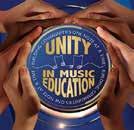
FMEA reserves the right to approve any application for appearance and to edit all materials proposed for distribution. Permission is granted to all FMEA members to reprint articles from the Florida Music Director for non-commercial, educational purposes.
Non-members may request permission from the FMEA office.
SUBMISSIONS:
Article and art submissions are always considered and should be submitted on or before the 1st of the month, one month prior to the publication issue to: D. Gregory Springer, PhD, dgspringer@fsu.edu.
All articles must be provided in digital format (e.g., Microsoft Word). All applicable fonts and images must be provided. Images must be at least 300 dpi resolution at 100% of the size. All submissions must be accompanied by a proof (color, if applicable). Ads may be submitted via email to val@fmea.org
Advertiser Index
The Florida Music Director is made possible by the participation of the fol lowing businesses whose advertisements appear in this issue. They make it possible to provide you with a high-quality publication, and we gratefully acknowledge their support of our mission. We hope you will take special notice of these advertisements and consider the products and services offered. It is another important way you can support your professional association and the enhancement of Florida music education.
The publisher does not endorse any particular company, product, or ser vice. The Florida Music Education Association (FMEA) is not responsible for the content of any advertisement and reserves the right to accept or refuse any advertisement submitted for publication. Information for advertisers (rate card, insertion orders, graphics requirements, etc.) can be found at FMEAMediaKit.org Florida Music Director reserves the right to refuse any ad not prepared to the correct specifications OR to rework the ad as needed with fees applied.
ADVERTISER
Boston Conservatory at Berklee
Florida International University
Naples Concert Band
Sight Reading Factory
University of Florida
Advertisers shown in bold provide additional support to FMEA members through mem bership in the Florida Corporate and Academic Partners (FCAP) program. FCAP part ners deserve your special recognition and attention.
Shelby R. Chipman, PhD, President Florida Music Education Association
Shelby R. Chipman, PhD
President Florida Music Education Association
October 2022 5
............................................................................... 19
......................................................................... IFC
20
40
................................................................................................... 8
Advocacy Report
We the People – PART ONE

Iwas in the mezzanine at the St. James Theatre in New York City enjoying a performance of the Into the Woods revival when my silenced phone started to vibrate gently. I knew why. It was August 23, primary election day in Florida. As I sus pected, when I glanced at the texts during intermission, friends from my county and throughout the state were weighing in, and in some cases, stressing over the election results. Most of the angst related to local school board elections. Some of my friends were concerned about run-off elections still to come in November. Other folks were disappointed with results in local elections.
When I got back to my Airbnb that eve ning, I had some time to review the results and other election data. What stuck out? Not surprisingly, the turnout percentag es. The percentage of eligible voters who turned out to vote was 25.87%. Roughly 26%. That means 74% of Floridians did not participate. When you dive into the numbers, there is wide variation. Sumter County had 44% turnout. The Villages are in Sumter, Lake, and Marion counties. A reasonable hypothesis suggests this retirement community reflects consistent statistics showing that older Americans are more likely to vote. On the other end of the spectrum, it was deflating to see such low turnout numbers in Osceola County at roughly 18% and in MiamiDade at 19%. You can find your own coun ty here. While I have some opinions as to why turnout varies dramatically, I leave that to explore in greater detail in next month’s part two of this article.
As I was poring over the election infor mation late in the evening on August 23, I couldn’t stop thinking about the Into the Woods performance. Yes, of course the
Jeanne W. Reynolds Chairperson Government Relations Committee

performers were magnificent, and the professionalism of a Broadway produc tion is often breathtaking and extraordi nary. But what made the experience so profound and magical was the audience.
At critical moments, the audience collec tively held their breath. You could hear a pin drop; there was not a single cough.
At other moments, the audience acted as one—enthusiastically applauding and offering wildly appreciative ovations. And for those of you familiar with the work, you won’t be surprised to learn there were times you could hear the audi ence collectively trying to silence sniffles as they wept. Indeed, the audience was a critical part, if not the most important part, of the experience.
Clearly a random group of 1,700 people in a theatre audience would never agree on politics, or even agree on a review of that particular performance, yet together we had a profound shared experience. Isn’t that what we should be experienc ing in a democracy? Just as gifted artists cannot create a profound performance without the audience, elected leaders do not create or nurture a democracy. That is
our job—we the people. No one is alone. We must do this together. Yet clearly, we the people need to be much more engaged. What will it take to energize our friends, colleagues, and neighbors to engage enthusiastically in democracy?
I encourage all of you to reflect on this.
At the absolute minimum, do everything in your power to inspire friends, neighbors, and colleagues to vote on November 8. Check out FMEA’s “Music and Arts For All Requires Advocacy by All” flyer for more information. If you are reading this prior to October 11, make sure everyone you know has registered to vote.
I believe those of us involved in the performing arts have a greater duty to inspire our friends and neighbors to par ticipate in democracy. We know how to bring disparate people with wildly vary ing talents and points of view together to create performances. We know how to create wholes that are much greater than the sum of individual parts. And we know it’s incredibly hard work. It is easy to give up—but in the words of Stephen Sondheim below—I remind you that you are not alone. We can do this together.
Hard to see the light now
Just don’t let it go
Things will come out right now We can make it so Someone is on your side
No one is alone
Intermission – to be continued next month …
6 Florida Music Director
Music

P r i m a r y E l e c t i o n A u g u s t 2 3
p r e p
r e p a r e t o v o t e
r e t o v o t
V i s i t y o u r s u p e r v i s o r o f e l e c t i o n s w e b s i t e : w w w . m y f l o r i d a e l e c t i o n s . c o m / C o n t a c t y o u r S O E
C h e c k y o u r r e g i s t r a t i o n s t a t u s A S A P ( y o u c a n c h e c k y o u r v o t e b y m a i l s t a t u s , a s w e l l ) .
M a k e p l a n s t o v o t e o n A u g u s t 2 3 , v o t e e a r l y , o r r e t u r n y o u r m a i l b a l l o t i n p l e n t y o f t i m e . E v e n t h o u g h F l o r i d a i s a c l o s e d p r i m a r y s t a t e t h e r e a r e i m p o r t a n t n o n p a r t i s a n r a c e s i n A u g u s t e v e r y o n e n e e d s t o v o t e !
B e e n g a g e d i n l o c a l e l e c t i o n s S c h o o l B o a r d , C o u n t y C o m m i s s i o n e r s , C o u n c i l M e m b e r s , J u d g e s
S c h o o l B o a r d r a c e s a r e c r i t i c a l l y i m p o r t a n t t o t h e f u t u r e o f m u s i c a n d a r t s e d u c a t i o n S o m e s e a t s w i l l b e d e c i d e d i n A u g u s t .
A s k s c h o o l b o a r d c a n d i d a t e s a b o u t t h e i r s u p p o r t a n d p l a n s f o r a r t s e d u c a t i o n
I f y o u a r e n e w t o t h e s t a t e , y o u m u s t r e g i s t e r b y O c t o b e r 1 1 t h t o b e e l i g i b l e t o v o t e i n N o v e m b e r .
b e c o m i n g a n i n f o r m e d v o t e br e c o m i n g a n i n f o r m e d v o t e r
L o o k f o r n o n p a r t i s a n , u n b i a s e d i n f o r m a t i o n s u c h a s t h e g u i d e s t h e L e a g u e o f W o m e n V o t e r s p r o v i d e o n t h e i r w e b s i t e o r w w w v o t e 4 1 1 o r g
C o n s i d e r e n d o r s e m e n t s f r o m t r u s t e d o r g a n i z a t i o n s a n d p u b l i c a t i o n s , y e t b e a w a r e o f t h o s e o r g a n i z a t i o n s ' b i a s e s
D o y o u r o w n r e s e a r c h o n t h e c a n d i d a t e s ' a c t u a l s t a t e m e n t s a n d p o s i t i o n s .
A t t e n d l o c a l c a n d i d a t e f o r u m s a n d e v e n t s .
B e o n t h e l o o k o u t f o r d i s i n f o r m a t i o n , m i s i n f o r m a t i o n , a n d m a l i n f o r m a t i o n .
V o t i n g i s y o u r a d v o c a c y s u p e r p o w e r . U S E I T !
October 2022 7 G e n e r a l E l e c t i o n N o v e m b e r 8
and Arts for MAll usic and Arts for All Requires RAdvocacy equires Advocacy BY BALL Y ALL
a
pe

8 Florida Music Director UNIVERSITY OF FLORIDA School of Music UNIVERSITY OF FLORIDA APPLICATION DEADLINE: November 1 admissions.ufl.edu SCHOOL OF MUSIC APPLICATION arts.ufl.edu/music INCOMING FRESHMEN AUDITION DAYS Saturday, January 28, 2023 Sunday, January 29, 2023 Saturday, February 4, 2023 TRANSFER AUDITION DAY Saturday, March 25, 2023 UNDERGRADUATE DEGREES BACHELOR OF MUSIC Performance Music Composition Music Theory Combination with an Outside Field BACHELOR OF MUSIC in Music Education BACHELOR OF ARTS Music Entrepreneurship Event Management Music History and Literature Music History and Literature: Ethnomusicology Music Theory or Composition MINORS Music Performance Music Theory History/Ethnomusicology Jazz Studies CERTIFICATES Music in Medicine Music Performance GRADUATE DEGREES MASTER OF MUSIC Performance Music Education (campus/online) Conducting Theory Composition History & Literature Sacred Music PH.D. IN MUSIC EDUCATION PH.D. IN MUSIC Composition Musicology/Ethnomusicology DOCTOR OF MUSICAL ARTS Conducting Composition Performance MORE INFO: music@arts.ufl.edu | 352.392.0224 ARTS.UFL.EDU/MUSIC
Building Community: Your Voice Matters!
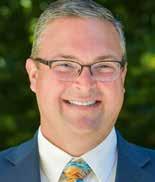
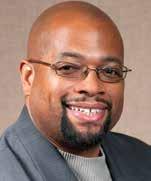
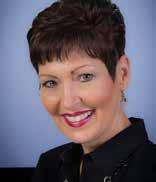



Do you remember who or what influenced your decision to become a music educator?

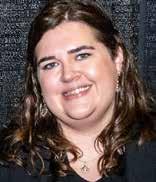

The noise of today’s news, politics, and social media can challenge your emotional health and cause you to lose sight of your why.
Participant interest will guide our facilitated discussions as we engage with teacher leaders throughout Florida to examine the current state of the profession, what led us to this point, and how we move forward with a renewed passion for music’s essential and vibrant role in the curriculum. This open and honest dialogue will be the catalyst for a plan of action to build camaraderie and to be a more inclusive professional community of music educators. FMEA values each member’s unique perspective, so come and let your voice be heard!
Presenters
Ernesta Chicklowski Beth Cummings
Bernie Hendricks Shelby Montgomery
Jeanne Reynolds
Ajori Spencer Jeannine Stemmer
Scott Sheehan
PRE- CO N F ERENCE
2023 FMEA Pre-Conference Wednesday, January 11, 2023—1-5 pm
October 2022 9
Professional Development Conference
IN MUSIC EDUCATION
Building Communities One Note at a Time
January 11-14, 2023
Tampa Convention Center, Tampa, FL
wait to
in Tampa this
The FMEA Professional Development Conference is one of the largest music education professional development events in the United States. In addition to approximately 250 clinic sessions and concerts, it is host to 23 all-state ensembles featuring Florida’s top band, orchestra, chorus, guitar, Orff, and popular music students conducted by world-class conductors and teachers.
It is attended by more than 10,000 people, including secondary music directors, elementary music teachers, music supervisors, college students, college music teachers, school administrators, K-12 students performing in the all-state ensembles, students and professional musicians performing with invited performing ensembles, exhibitors, and parents and family members of performing students.
So many reasons to participate:
« An exhibit hall with world-class exhibitors providing products and services for music educators and students
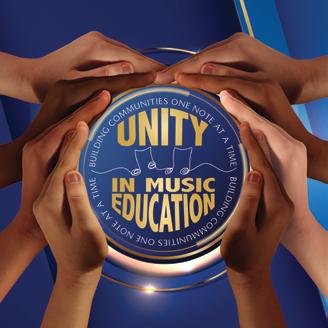
« More than 2,800 music teachers and 200 administrators
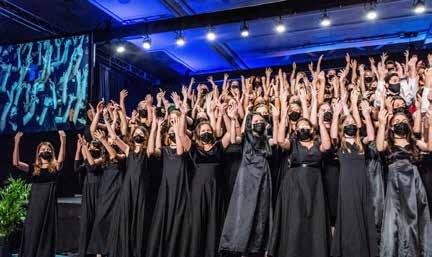
« More than 120 sessions, covering a variety of topics for all music educators, with on-demand access to recordings after the conference
« Performances and mini-concerts from some of Florida’s top music programs
« Networking opportunities, college fair, awards ceremony, and other special events
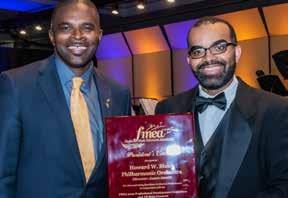

10 Florida Music Director
We can’t
see you
January!
UNITY
2023 FMEA
Important Dates
November 12, 2022

Hotel room cancellation deadline at 5 pm EST

November 14, 2022 Hotels will charge your credit card a nonrefundable deposit for the first night of each room reserved.


December 11, 2022
Preregistration closes at 12 midnight EST. Payment must be postmarked on or before December 4 if you are paying by check. Preregistration is by credit card only after December 5.

December 12, 2022
You can begin the on-site registration process online to generate an invoice with the on-site prices, but you must bring your payment to the conference.
December 16, 2022
All school lodging checks are due, payable to the hotel where reservations were made for yourself and/or your students.
December 16, 2022
The final deadline for discounted hotel blocks. Unsold rooms in the FMEA blocks are released back to hotels.
Registration
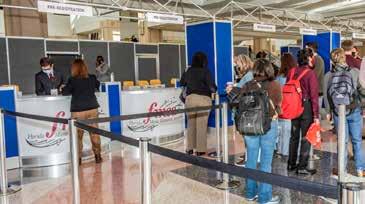
Membership in FMEA and NAfME is a prerequisite for registration. See the Registration Policies for details.

All registration information must be entered online, beginning September 17 (click HERE ). At the end of the online form, you will have the opportunity to print an invoice to send in with a check until one week before the preregistration deadline or to pay online instantly with a credit card until the preregistration deadline.
Please Note: To assist our members, their students, and chaperones as they visit exhibit booths, all badges will have a barcode encoded with contact infor mation. Attendees will be able to allow exhibitors to scan their badges rather than manually writing information on contact cards or mailing lists at their booths. In order to maintain a positive relation ship with our exhibitors who can benefit your students through scholarships, new equipment, sheet music, software, and more, we ask that you please provide the ACTUAL, CORRECT MAILING ADDRESS and EMAIL for each of your students and chaperones and do NOT simply enter your school address or other incorrect information.
Registration Fees
Description
Director/Member
Collegiate Member
Retired Member
Non-Teaching Spouse
Non-Teaching Spouse of Retired Member
Paid Chaperone
Free
All-State Student
Tri-M Student
Preconference Workshop
Preconference Workshop (First-Year Teacher)
Student Experience – Student
Student Experience – Chaperone
$125
$75
$125
$125
$75
$75
To take advantage of early discounted rates, you must register and pay before the deadlines.
Note: If you are mailing a check to the FMEA office to pay for your registration, it must be postmarked early enough so that it will ARRIVE in the FMEA office before the preregistration deadline.

12 Florida Music Director
Preregistration Rates: Sept. 17-Dec. 11 On-Site Rates:
$155 $200
$70 $100
$25 $25
$100 $150
$0 $0
$75 $125
Chaperone $0 $0
$75
$50
$75
$75
$50
$50
Registration Policies
1. All participants—directors, students, chaperones, and guests—must be registered for the conference.
2. Only directors may register their groups or pick up registration materials if preregistered.

3. All participating students must be chaperoned. As required by FMEA and FSMA, at least one chaperone other than a director is required for every ten (10) students or fraction thereof; however, FMEA policy allows for one free chaperone for every six (6) students or fraction thereof.
4. An additional paid chaperone may be registered for (a) each six (6) students registered or (b) for each all-state rehearsal site where registered students are performing.
5. If a participating student is not accompanied by the director from that student’s school, then the principal from that school must furnish a letter designating the person from the school or school district who is to be in charge of that student. The letter should be addressed to the FMEA executive director, must explain the extenuating circumstances preventing the director from attending, and must be submitted with registration materials. The school will be notified of approval.
6. Student observers are not allowed to attend the conference. If any student observers are brought to the conference, the offending school’s participation in the conference may be eliminated the following year. (Tri-M students registered and participating in sessions or working for the all-state concerts are exempt from this rule.)
7. All school music teachers must register for the conference as FMEA directors and must be current members of the FMEA. This includes directors of invited performing groups or mini-concerts, and session presenters. All-state conductors from Florida schools, colleges, or universities must also be FMEA members. No current music teacher may register as a chaperone.
Refund Policies
1. Full registration refunds are available for cancellation requests made through December 15, 2022.
2. No registration refunds will be made for cancellations made after December 15, 2022, except for emergency situations. These will be reviewed on a case-by-case basis.
3. Refunds must be requested in writing (email is acceptable).
4. All requests for refunds must be received no later than January 31, 2023. Requests received after that date will not be processed.
5. All refunds will be issued after the conference is completed.
6. There are no refunds for concert tickets.
Chaperone Registration
Chaperone registration is based on the following rules:
Elementary Students
« For each elementary student registered, one free chaperone and one paid chaperone may be registered.
« Any additional attendees must purchase a guest pass at on-site registration for entry into the convention center.
Middle School and High School Students
« For every six (6) students registered, one free chaperone and one paid chaperone may be registered. No other chaperones may be registered until the seventh student is registered.
« Any additional attendees (chaperones or guests) must purchase a guest pass at on-site registration for entry into the convention center.
« Exceptions
• If you have students in more than one performing ensemble, you may pay for a chaperone for each performing ensemble in which you have registered students.
• If you have students from different schools, you may pay for a chaperone for each school for which you have registered students.
Chaperones are not allowed to bring other children who are not participating in an all-state ensemble Only registered students, teachers, and chaperones wearing a conference badge are allowed in and around the rehearsal areas. Directors are asked to make sure their chaperones are aware of this policy before agreeing to serve as a chaperone.
October 2022 13
Hotels
Greetings! It’s that wonderful time of year when we start planning our very special conference event. The Florida Music Education Association has contracted the following Tampa hotels for the January 11-14, 2023, Professional Development Conference. Please telephone your hotel of choice directly from the list below beginning Sept. 24, 2022, at 9 am EDT. Guest rooms at the contracted rates are available until the room block is full or until the cancellation deadline of Nov. 12, 2022, at 5 pm EST. If your hotel of choice is sold out, please continue to try to make a reservation until Nov. 12, 2022, as FMEA attendees will periodically release surplus guest rooms.

A maximum of five (5) guest rooms may be reserved per teacher or parent. Each and all rooms reserved on Nov. 14, 2022, will be charged a non refundable, one-night fee to the respon sible credit cardholder. (Invalid credit cards risk reservation cancellation.)

We urge any guest holding surplus reservations/rooms to cancel excess reservation(s) as soon as possible and no later than 5 pm EST on Nov. 12, 2022, and you must secure a cancellation confirmation number. (This courtesy will make surplus rooms available to other guests.) In order to receive compli mentary rehearsal and meeting space, you should book guest rooms in the hotel you are using for your group functions.
NOTE: FMEA IS NOT offering a housing bureau service. All participants MUST call the hotels directly beginning Sept. 24, 2022, at 9 am EDT to request the “Florida Music Education Association” room block rate and confirm the guest room rate listed on the next page. We look forward to seeing you in Tampa!


14 Florida Music Director
2023 FMEA Professional Development Conference January 11-14, 2023
Tampa Convention Center, Tampa, FL
Contracted Hotels
HOTEL RESERVATIONS – Cutoff date: 11/12/22
Barrymore Hotel Tampa Riverwalk
111 West Fortune Street, Tampa, FL 33602
Comp. internet & self parking
Courtyard by Marriott Downtown Tampa
102 East Cass Street, Tampa, FL 33602
Comp. internet; $30 valet only
Embassy Suites Downtown
513 South Florida Avenue, Tampa, FL 33602
Comp. internet & breakfast; $24 valet only
Embassy Suites Tampa Airport Westshore
555 North Westshore Blvd., Tampa, FL 33609
Comp. internet, self-parking, & breakfast
Four Points by Sheraton Suites
Tampa Airport Westshore
4400 West Cypress Street, Tampa, FL 33607
Comp. internet & shuttle to Tampa airport; $10 self parking
Hampton Inn Tampa Downtown Channel District
1155 East Kennedy Blvd., Tampa, FL 33602
Comp. internet & breakfast; $22 self parking
Hilton Downtown
211 North Tampa Street, Tampa, FL 33602
$9.99 internet (Comp. for HH); $35 valet only
Home 2 Suites Tampa Downtown Channel District
1155 East Kennedy Blvd., Tampa, FL 33602
Comp. internet & breakfast; $22 self parking
Sheraton Tampa Riverwalk Hotel
200 North Ashley Drive, Tampa, FL 33602
Comp. internet; $36 overnight valet; $20 daytime valet
Tampa Marriott Water Street Hotel (formerly Marriott Waterside)
505 Water Street, Tampa, FL 33602
Comp. internet for Bonvoy members; $33 overnight valet; $23 daytime valet
Westin Tampa Waterside
725 South Harbour Island Blvd., Tampa, FL 33602
Comp. internet; $30 valet only
(813) 223-1351
#1 for reservations Group Code: FMEA
(813) 229-1100, ext. 1 Group Code: FMEA
(813) 769-8300 #1 Group Code: FM3
(813) 875-1555 #2 Group Code: FME or FMEA 2023
(800) 368-7764
Say “Associate”
No cell text reservation link Group Code: FMEA
(813) 525-9900, ext. 1 Group Code: F23
(800) 445-8667, ext. 1
Group Code: FMEA
(813) 525-9900, ext. 2 Group Code: FM3

(888) 627-8105 #1
Say “Associate”
No cell text reservation link
Group Code: FL3
(888) 789-3090 #1
Group Code: FMEA
(800) 937-8461
Say “Associate”
Group Code: FMEA
ROOM RATES
Single Double Triple Quad
$156 $156 $156 $156
$169 $169 $169 $169
$264 $264 $274 $284
$203 $203 $213 (up to 5 in room) $223 (up to 6 in room)
$148 $148 $148 $148
$199 $199 $199 $199
$227 $227 $227 $227
$224 $224 $224 $224
$229 $229 $249 $249
$211 $211 $211 $211
$217 $217 $217 $217
October 2022 15
Personal Health and Safety
Security Procedures
The Florida Music Education Association is working with the Tampa Police Department and Allied Security at the Tampa Convention Center (TCC) to enhance the confer ence experience for the students and attendees.
Great News!
In order to help keep attendees safe, there will be a heightened security presence throughout the TCC and at various hotels. All entrances to the TCC will be patrolled by uniformed officers of the Tampa Police Department and uniformed Allied Security person nel. They will be patrolling the TCC as well. The Tampa Police Department will be at the crosswalks between Marriott Tampa Water Street and the TCC, at concerts, and patrolling some of the downtown hotels during rehearsals.

All attendees (this includes members, exhibitors, chaperones, and student participants) must wear their conference badge during the conference once the authorized registrant obtains the conference packet.

Please be prepared for random bag and/or purse searches. It is encouraged, if at all possible, to use a clear bag, similar to those used at sporting events, for entrance.
Enjoy the Conference Experience.
Releases
Health Risk Acknowledgement
By registering for this event, I hereby acknowledge that I fully understand the nature and extent of the risk related to the COVID-19 virus and other contagious diseases and agree that by attending this conference and any related events, I do so at my own risk. Additionally, I expressly acknowledge the following:
« infection by COVID-19 can result in death;
« COVID-19 is highly contagious;
« the risk of infection and transmission are higher in indoor facilities;

« there are no safety precautions that totally eliminate the risk of contract ing COVID-19; and
« individuals with various underlying medical conditions may experience worse outcomes.

Information about the precautions we are taking is posted on our Health Information Page.


Photography/Videography
By registering for this event, I hereby grant permission to use any and all photo graphic imagery and video footage taken of me at this event and activities pertain ing to this event, without payment or any other consideration. I understand that such materials may be published electron ically or in print, or used in presentations or exhibitions.
16 Florida Music Director
Concert Tickets
All Concert Ticket Sales Are Final. No Refunds or Exchanges.
Please make sure you know the exact name of the all-state ensemble for which you need tickets before approaching the ticket sales window.
1. Registered (BADGED) attendees do not require tickets to attend any all-state concert. This includes directors/members, directors’ non-teaching spouses, performing all-state students, registered chaperones, collegiate student members, retired members, and VIP guests that you entered as part of your conference registration.
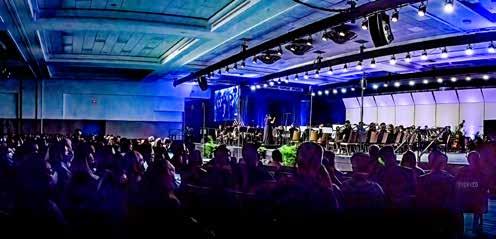
2. All nonregistered (NONBADGED) attendees (parents, family members, guests, etc.) are required to purchase tickets for any all-state concert they wish to attend at $20 per ticket.
3. There are no “free” or “allotted” tickets. All concert attendees must either wear their conference badge or purchase a ticket.
4. Directors who preregister online may reserve and prepay for all-state concert tickets for nonregistered attendees for concerts in which they have registered all-state students. If paid for online, these tickets will be preloaded into the director’s registration package.
5. Directors who register on site may purchase all-state concert tickets for nonregistered attendees for concerts in which they have registered all-state students during the on-site registration process.
6. Directors with all-state students may purchase additional concert tickets for nonregistered attendees for concerts in which they have performing students at the on-site registration desk or at a designated ticket sales location at anytime.
7. General ticket sales for all-state concerts will begin at 11 am on Thursday at the FMEA registration desk. There is no requirement that the director or any other registered attendee be the person purchasing these tickets after this time.
8. All ticket sales are final. Concert tickets are nonrefundable.
9. For entrance, ticket, and concert purposes, a concert is defined as the group of ensembles that are performing in the same venue in a common, defined block of time. An example of a “concert” for purposes of entrance, ticketing, etc., is the 6 pm concert on Saturday for the All-State Middle School Band, the All-State Concert Band, and the All-State Symphonic Band.
NOTE: No concerts will be held at the Straz Performing Arts Center.
Frequently Asked Questions

Do I get free tickets for my students’ family members to attend the concert?
No. You can pre-order and pay for their tickets when you preregister for the concert, but there are no free tickets.
Can I get free tickets to any concerts?
No. Registered attendees (directors, chaperones, students) are allowed admission to concerts with their name badge, so no ticket is necessary. Attendees that are not registered for the conference (parents, family, etc.) must purchase tickets.
Can I buy extra tickets anytime? If you are an FMEA member registered for the conference, you may purchase tickets at the computers in the on-site registration area anytime during the regular registration hours. Everyone else may purchase tickets beginning at 11 am on Thursday.
There are more family members and guests coming to watch my all-state student than I have tickets. How and when do they get tickets?
Extra tickets may be purchased when general ticket sales open. Tickets will be sold at the main registration area and cost $20 each.
Does my young child need to buy a ticket?
Everyone who will be taking up a seat will need a ticket. Babies that are being held by a parent or sitting on a parent’s lap for the duration of the concert are welcome without a ticket, but children who are old enough to sit in their own seat will need a ticket.
October 2022 17
All-State Rehearsal Locations

All-State Concert Band Sheraton Riverwalk
All-State Concert Chorus Tampa Marriott Water Street
All-State Concert Orchestra Tampa Marriott Water Street
All-State Elementary Chorus Tampa Convention Center
All-State Elementary Orff Ensemble Tampa Convention Center
All-State Guitar Ensemble Tampa Marriott Water Street
All-State High School Jazz Band Tampa Convention Center
All-State Intercollegiate Band Barrymore Hotel Tampa Riverwalk
All-State Middle School Band Hilton Tampa Downtown
All-State Middle School Jazz Band Westin Tampa Waterside
All-State Middle School Mixed Chorus Hilton Tampa Downtown
All-State Middle School Orchestra Tampa Marriott Water Street
All-State Middle School Treble Chorus Hilton Tampa Downtown
All-State Popular Music Collective Tampa Convention Center
All-State Reading Chorus Embassy Suites Downtown
All-State SSAA Chorus Westin Tampa Waterside
All-State Symphonic Band Tampa Convention Center
All-State Symphonic Orchestra Tampa Convention Center
All-State TTBB Chorus Embassy Suites Downtown
High School Honors Band Sheraton Riverwalk
High School Honors Orchestra Embassy Suites Downtown
Middle School Honors Band Hilton Tampa Downtown
Middle School Honors Orchestra Sheraton Riverwalk
18 Florida Music Director


Explore 50+ undergraduate and graduate music program offerings at bostonconservatory.berklee.edu/music. Amplify your artistry. INTERESTED IN SUMMER TRAINING? Register online for one of our summer programs in brass, composition, voice, or vocal pedagogy.
Naples
Concer t Band SEEKS
NEW MUSIC DIRECTOR / CONDUCTOR FOR THE 2023-2024 SEASON
Idyllic Southwest Florida destination awaits the right candidate!
Forover50years,theNaplesConcertBandhasbeen charmingitsloyalaudienceinthebeautifulsettingof CambierParkintheheartoftheCityofNaples. Boastingamemberstrengthofnearly100musicians andanaverageaudiencesizeof1,500 2,500 throughouttheplayingseason(October–April),we havebeenrecognizedbytheCityofNaplesasa “culturalinstitution”thatcontributestothequalityof lifeandgrowingreputationofthecityknownas “Paradise”ontheCoastofSouthwestFlorida.Thereis nothingmoresatisfyingthanaconcertintheparkona sunnySundayafternooninthedeadofwinter!

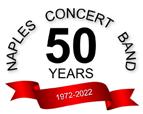
TheMusicDirector/Conductorplaysaleadingrolein thesuccessoftheorganization,andissupportedbyan activeBoardofDirectors,anenthusiasticandtalented membership,andahealthyoperatingbudgetmade possiblebyourdevotedaudienceandgenerous sponsors.Wearelookingforacandidatetoleadusinto thenext50yearsofmusicalmagic.
Interestedcandidatesareaskedtoprovidetheir qualificationsby D December 31, 2022.Whenresponding totheopportunity,weaskforthefollowing:
1.Acoverletterdescribingyourinterestand experience
educationalbackground
FinalistswillbeselectedinJanuary2023,andall candidateswillhaveanopportunitytoworkwiththe ensembleduringthe1st Quarterof2023.Adecisionis expectedbyApril2023.
20 Florida Music Director
2.Aresumeofyourprofessionalexperienceand
3.Samplesof3recentconcertsyouhave programmed 4.Linkstorecordingsofyourwork(i.e.,YouTube) 5.Threereferencesincludingcontactinformation
PARADISE IS CALLING! FOR MORE INFORMATION Contact: Bud Gartland, Vice President NCB Email: bud@evg3consulting.net Additional details can be found on our website: www.naplesconcertband.com/conductor-search
Student Leadership Session
Wednesday, January 11, 2023, 1-4:30 pm
Presenter: Anne M. Fennell, MEd
In It to Win It, for Everyone!
This workshop is designed for all high school student leaders who want to learn, thrive, and become the best leader for their schools, peers, and themselves. Attendees will participate in active conversations and team and relationship building activities while also discovering their personal strengths and needs to continue to grow on their leadership journeys. Everyone will be engaged in a culture of inclusivity to see and hear all students whle revealing the unique strengths and knowledge of our combined voices and experiences.
STUDENT E X PERIENCES
Tri-M Conference Experience
The purpose of the Florida Music Education Association

Tri-M Conference Experience is to provide students with experiences that will build their leadership and advocacy skills, as well as expose them to the experiences available at the annual conference.
Participating students will interact with amazing clinicians and educators, college representatives, and incredible performing groups. These students will have memorable experiences they can take back and share with their high school music programs.
Student Conference Experience
Thursday, January 12-13, 2023
Presenter: Anne M. Fennell, MEd
The purpose of the Florida Music Education Association Student Conference Experience is to expand access to the annual conference to students from throughout the state. Participating students will interact with amazing clinicians and educators, college representatives, and incredible performing groups. These students will have memorable experiences that they can take back and share with their high school music programs. The program will take place on Thursday and Friday of the 2023 FMEA Professional Development Conference.
Students will participate in workshops, observe rehearsals, attend College Night, and engage in networking and social activities with their peers.
Anne M. Fennell, MEd, is the president of the California Music Educators Association and the K-12 music program manager for San Diego Unified School District in San Diego, California. She holds the BME, the MEd in educational leadership studies, and Orff-Schulwerk certification Levels I-II-III, and has more than 90 graduate hours in music and additional education course work. Her experiences include 32 years of teaching music composition and steel drum ensembles in grades 9-12, teaching K-8 integrated arts and music through Orff-Schulwerk, and leading both vocal and instrumental ensembles in civic and profession al performances, including national music conferences and the annual NAMM Board of Directors’ meetings in 2013 and 2016. She is a published author through Pearson
Education, the GRAMMY Foundation, the Percussion Marketing Council, and Disney’s Little/Baby Einsteins. She presents sessions and gives keynotes both nationally and internationally, including state MEAs, the American Orff-Schulwerk Association, the National Association for Music Education, the Organization of Economic Cooperation and Development, China music education confer ences (through the support of the International Music Products Industry (NAMM)), and the International Society for Music Education. She has received numerous state and national awards: the 2020 Technology in Music Education National Teacher of the Year, 2017 Magnet Schools of America National Teacher of the Year, top 10 GRAMMY Music Educator Finalist for 2016, and top 3 Music Educator Award from Music and Arts in 2015.
 FMEA now offers two experiences for high school students who are not participating in an all-state ensemble, the Student Conference Experience and the Tri-M Conference Experience Read the comparison here
FMEA now offers two experiences for high school students who are not participating in an all-state ensemble, the Student Conference Experience and the Tri-M Conference Experience Read the comparison here
October 2022 21
Fred Schiff, Chairperson
After meaningful discussions with our part ners at Hal Leonard, the Florida Corporate and Academic Partners Committee (FCAP) is thrilled to announce that three incredible sessions featuring three of the best educators in world will present on Friday at the 2023 FMEA Professional Development Conference. In a nutshell, FVA, FOA, and FBA were asked for a short list of names they wanted their members to see, and Hal Leonard made it happen. It is my pleasure to announce that Dr. Matthew Arau (FBA), Dr. Rollo Dilworth (FVA), and Dr. Robert Gillespie (FOA) will be in Tampa in January to address our members. These Pilot Program sessions, though funded by Hal Leonard, are not about the products they sell.
This is an ideal partnership, whereby each presenter will be offering music teachers additional tools to face the issues they encounter in and out of the classroom, allowing all of us to improve.
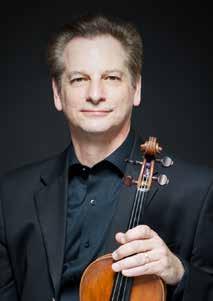
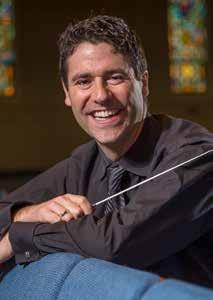
As I have stated before, the quality of the music business community is dependent on quality class room teaching, and it is our intention to make sure all of our communities grow and flourish.
If you are a Corporate or Academic Partner that has an idea on how you can help any of our FMEA compo nents and would like to be seen on another level for the 2024 conference, then please contact me. I look forward to our conversations.
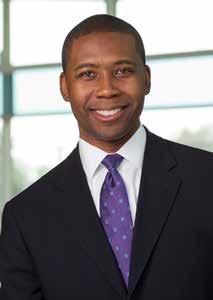

 FLORIDA CORPORATE & ACADEMIC PARTNERS COMMITTEE
Dr. Matthew Arau
Dr. Rollo Dilworth Dr. Robert Gillespie
2023 FMEA
FLORIDA CORPORATE & ACADEMIC PARTNERS COMMITTEE
Dr. Matthew Arau
Dr. Rollo Dilworth Dr. Robert Gillespie
2023 FMEA
PILOT PRO G RAM
A Pilot Program First for the
Conference 22 Florida Music Director Renew your partner membership TODAY! CLICK For more information, call 850-878-6844 email info@flmusiced.org visit FloridaMusicEducation.org/partners
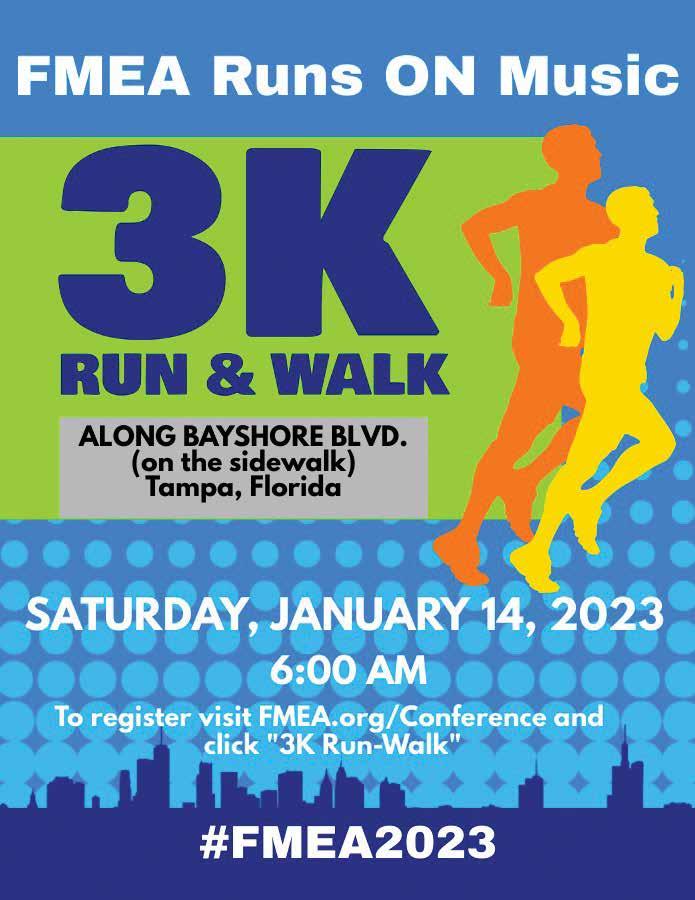
October 2022 23
Trauma’s Influence on Life
The Importance of Trauma-Informed Pedagogy
by Christopher Beach, MM, MT-BC
IImagine you are in the seventh grade, and your best friend is about to perform a solo for the spring choir con cert. Your choir director asks you the day of the concert to introduce your friend. You agree and prepare a threesentence introduction. This is your first time speaking in front of an audience—in fact, it is your first time in front of an audience doing anything solo altogether. Your intro duction is written down, and you have practiced it to the point that you are able to say it from memory. You recite the speech perfectly during the dress rehearsal.
Fast-forward to the concert. The gymnasium is filled with 500 people, including parents, grandparents, sib lings, friends, schoolmates, and teachers. The choir teach er is offstage but nearby. The time has come, and you step into the spotlight to begin your elaborate speech. In the middle of the first sentence, your tongue knots up, and you stammer to finish the sentence but are unable to do so. The entire audience laughs as you struggle, but you continue to mess up. Similarly, the laughing continues.
You begin to get dizzy and start to black out amid the laughter, failing to realize you have been standing there for almost 30 seconds trying to make it through this experience, but failing to finish a single sentence. As you
come back to your senses, you struggle to turn your body to your teacher. She walks onto the side of the stage and tells you to take out your speech and read it directly from the paper. You do so, while snickering can still be heard within the audience. You mumble through the remainder of your speech and walk off the stage, defeated.
Trauma – What is it?
When an individual experiences an event or a situation that alters the way they function in society, the event might be considered traumatizing. In the above scenario, complete dissociation from an event is a signifier of a potentially traumatizing experience. To understand how to work with individuals who have histories of trauma, it is important to examine what trauma is.
Trauma is a normal reaction to an abnormal event and is a whole mind-body experience. Scenarios that might be considered traumatizing can include cultural disparities, natural disasters, assault/abuse, and medical illnesses, to name a few.
Individuals who experience such events might show symptoms or changes in their overall demeanor, as the
24 Florida Music Director Continued on page 26

October 2022 25
Trauma’s Influence on Life
from
definition of a trauma is an exposure to an event that affects an individual’s abil ity to function normally (Briere & Scott, 2015). The Diagnostic and Statistical Manual of Mental Disorders – 5th Edition (DSM-5) suggests that an individual who has expe rienced a traumatic event may show symp tomatology within the emotional, physical, psychological, and social realms (Beach & Ritchie, 2021). In my experience as a music therapist, to understand trauma symptom atology better, it is necessary to have a functional under standing of the human nervous system. Figure 1 provides an illustration of the nervous system as it is currently understood.
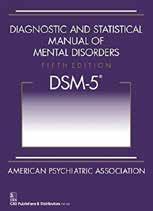
It is often said that the sympathetic and parasympathetic nervous systems house the primary functions relating to trauma. The sympathetic nervous system is the part of the nervous system that prepares the body to respond to potential threats, also called the “fight-or-flight responses.”
The parasympathetic nervous system is the part of the body that maintains balance and homeostasis. It is vital that all who are in helping professions (including music educa tors) understand the importance of knowing how trauma works in the body and how to work with individuals who have experienced trauma.
 Figure 1. Central Nervous System
Figure 1. Central Nervous System
26 Florida Music Director
Continued
page 24
Though the sympathetic and parasympathetic nervous systems are part of the autonomic nervous system, they are connected to the central nervous system through efferent nerves. As certain regions of the brain interpret these signals, perceived appropriate responses are initi ated. Therefore, trauma might be difficult to understand because, though it is thought of as a peripheral nervous system concept primarily, it is heavily influential within the central nervous system.
When trauma is experienced, the message of stress/ danger overrides the ability of the brain to work through logical thought processes, causing difficulty or an inabili ty to process or respond in healthy ways. Individuals who are put into stressful and foreign scenarios might show physiological behaviors. When individuals are placed into these scenarios without proper processing, they may actually create an emotional association with the event. The more frequent the exposure, the stronger the neural bond, leading to an intensification and solidifying of the response.
Survivors of trauma often exhibit behaviors that exist within emotional, physical, psychological, and social levels (Beach & Ritchie, 2021). For classroom settings, it is crucial that instructors understand that manifestation of these symptoms is not necessarily something that can be seen or understood, as they stem from individual perception and experience. In the emotional realm, an individual might show dysregulation or negative self-per ception. Individuals with physical responses might show somatic symptoms (e.g., headaches, stomachaches, weak ened immune systems) or avoidance of potential triggers. Psychological manifestations might include changes of consciousness (such as the student blacking out in the scenario previously described), hypoarousal, hyperarous al, or flashbacks. Finally, social symptoms might include isolation or trust issues (Beach & Ritchie, 2021).
Trauma-Informed Pedagogy
Stressors and potentialities of trauma can exist within any scenario. No individual controls the day they see a car accident, the day a family member passes away, the day someone is kidnapped, or the day they experience a med ical illness. No one can foresee the day when one of their students walks onto the stage to present something to an audience (having provided no suggestion of concern) and then stumbles through their speech. As stated previously,
when these events happen, it can affect the entire body. How do instructors use the concepts of trauma-informed pedagogy to avoid triggering individuals? How do we encourage educators, those empowered to teach and develop our children’s minds, to address an issue as com plicated, intrusive, and sophisticated as trauma?
The implications of trauma on the body’s overall sys tem demonstrate the imperative need for an approach that accounts for these responses. Many individuals suggest that trauma-informed pedagogy might be a necessary approach in the future of education. Trauma-informed pedagogy is a “pedagogical practice that keeps trauma, its prevalence, and how it affects an individual, in mind” (Trauma-Informed Pedagogy, n.d., para. 2). Others, such as Harrison et al. (2020), expanded this definition to include symptomatology, as well as individual identities and any interacting entities, within organizations. The goal of trauma-informed pedagogy in the classroom is to provide educational experiences and information that attempt to avoid potential retriggering.
Guidance for Trauma-Informed Pedagogy
In order to cultivate a learning environment that alleviates potential trauma-inducing results, Imad (2020) summa rized seven principles of guidance for trauma-informed pedagogy: (1) work to ensure safety, (2) build transpar ency and communication, (3) provide support, (4) enable choice and decision making among students, (5) build on students’ strengths, (6) be aware of potential marginal izing issues in society, and (7) instill a sense of purpose. These steps are critical in combatting the effect of trau matization in such a way that it allows students to engage at the level of their own comfortability while still being set up for success. Not only does it provide the students opportunities, but it also requires the instructor to engage in self-education of events (past and current) that might be damaging to others. With the understanding of what trauma is and the principles highlighted by Imad (2020), I suggest that trauma-informed pedagogy demands a col laborative process between student and teacher.
Research has documented children as being some of the most vulnerable to trauma, simply due to develop mental stages (Jowett et al., 2020). As a child’s brain builds connections, enhances learning, and stores memories, it does not exclude negative experiences. It is for this reason
October 2022 27 Continued on page 28
Trauma’s Influence on Life
Continued from page 27
that educators should change their way of thinking about individual students from “what is wrong with you” to “what happened to you” (Hess & Bradley, 2020, p. 441). By changing this frame of thought, we encourage individuals to be open about their experiences and themselves rather than isolating themselves and feeling demeaned, which are behaviors of survivors of trauma.
Providing an open space for survivors of trauma to feel welcomed and invited is of utmost importance. Although these individuals may not use the space, it is crucial that we as educators provide it to them so that the space is a safe environment for them to step away from the stress and trauma experience. In so doing, we provide them an opportunity to lessen the reinforcement of the trauma. (Think back to the concept of strengthening the neural bond discussed previously.) We want to create an atmo sphere that allows the individual to stop perseverating on the issue, and if initiated, to process the trauma in an appropriate way. It is imperative for the educator to feel comfortable in helping the student with processing these events and feelings. Otherwise, they should provide resources to the child along with a referral to a qualified professional.
Conclusion
As educators, we hold a significant responsibility in ensuring that all students within our charge are safe, both physically and mentally. When students experience trauma, we have the ethical responsibility to do what we can to ensure safety for those students. We do not want them to establish a negative or damaging relationship with an experience, but rather process the experience and learn how to adapt it to better serve them in a healthy, developing way.
I want to revisit the scenario from the beginning of this article. After I walked off that stage, nobody talked with me about this experience until 18 years later, when I opened up about the repercussions of the experience. Yes, the scenario at the beginning of the article was my personal experience. In the time it took for me to realize the ramifications of that night, significant damage had been done. I have difficulty with public speaking. When I am placed in this situation, I often find myself reliving the dissociation that I experienced 18 years ago. I have difficulty being in a crowd, and I remain secluded and
isolated—not only my physical body, but also my mental thoughts. I cannot share information with people without fear of judgment. Occasionally, I will find that I also begin to feel nauseated and start to dissociate from the experi ence, just like I did in the seventh grade.
As educators, we have the resources and tools to better understand the damage that trauma has the potential to cause. We are charged with protecting our students from the harmful effects of trauma as we strive to encourage individual and group development and success for each student. Using a trauma-informed pedagogical approach to education will help us to offer a place of safety for each individual. No educator should have to see a young stu dent walk off a stage in defeat and suffer from the effects into adulthood. The damage is just too great.
Christopher Beach, MM, MT-BC , is a board certified music therapist who is pur suing the PhD in music education with a focus in music therapy from Florida State University. With prior experience in mental health and supervision, Mr. Beach is a grad uate assistant and is focusing his research on trauma work in music therapy.
References
Beach, C., & Ritchie, C. (2021, October 17). Neurobiology of trauma and music therapy [Conference presentation]. American Music Therapy Association National Conference, virtual conference. Briere, J. N., & Scott, C. (2015). Principles of trauma therapy: A guide to symptoms, evaluations, and treatment (2nd ed.). Sage Publications.
Harrison, N., Burke, J., & Clarke, I. (2020). Risky teaching: Developing a trauma-informed pedagogy for higher education. Teaching in Higher Education. Advance online publication. https://doi.org/10.1080/13562517.2020.1786046
Hess, J., & Bradley, D. (2020). Dewey’s theory of experience, traumatic memory, and music education. Studies in Philosophy and Education, 39, 429-446. https://doi.org/10.1007/s11217-02009706-z
Imad, Mays. (June 3, 2020). Leveraging the neuroscience of now. Inside Higher Ed https://www.insidehighered.com/ advice/2020/06/03/seven-recommendations-helping-studentsthrive-times-trauma

Jowett, S., Karatzias, T., Shevlin, M., & Hyland, P. (2020). Psychological trauma at different developmental stages and ICD-11 CPTSD: The role of dissociation. Journal of Trauma & Dissociation, 23(1), 52-67. https://doi.org/10.1080/15299732.2021 .1934936
Trauma-Informed Pedagogy – Division of Teaching Excellence and Innovation | UCI. (n.d.). Retrieved September 27, 2021, from https://dtei.uci.edu/trauma-informed-pedagogy/
28 Florida Music Director
Please take time to thank and support our 2022-2023 Academic Partners.




GOLD PARTNERS
Partners as of September 8, 2022.
*Please visit FMEA.org/partners for partnership details or call 850-878-6844.




October 2022 29
Essential Jazz Pedagogies and Resources
by Jeffrey Benatar, DMA
EEvery jazz ensemble is evaluated on its ability to groove, its ability to interact in the moment, and its ability to artic ulate. The following three pedagogies are essential for success: (1) bass/drum “lock-up,” (2) effective “comping,” and (3) swing phrasing and articulations. A strong bass/ drum lock-up requires matching quarter notes and the development of playing “backside,” “frontside,” or in the middle of the beat. Effective comping requires systemat ically expanding rhythmic capabilities. Swing phrasing and articulations require democratic decision making. In this article, I describe these three essential pedagogies that will take your jazz musicians to new levels.
First, the bass/drum lock-up is essential for groove. In swing music, the drummer plays a specific “spang-a-lang” ride pattern while the bass player’s walking quarter notes must line up to create enough of a pocket that the whole band can swing along with them. One technique to make sure that the quarter notes in that swing feel line up is to reduce the drummer’s ride pattern and the bassist’s walk ing line to only quarter notes. After doing 30 to 60 seconds of this technique, the bass/drum lock-up is immediately stronger. Higher level musicians should also be able to play on the backside, frontside, or right in the middle of the beat, utilizing only quarter notes before reintroducing more complicated fills or ride patterns. These variations on the quarter note pocket allow the bass/drum groove to help hold the band back from speeding up the tempo, keep a fast-paced tune from slowing down, and/or permit soloists to push or pull on the time without the rest of the band/backgrounds losing their clarity.
Second, seasoned ensembles employ effective interac tion. The basic building block of interaction is comping, referring to ‘comp’lementing or ac’comp’anying the soloist.

30 Florida Music Director Continued on page 32

October 2022 31
Essential Jazz Pedagogies and Resources

This is a standard role of chordal instru ments—piano, guitar, or vibes. The most commonly taught comping rhythm is the Charleston rhythm, a dotted quarter fol lowed by an eighth note. Particularly in the swing idiom, this is a relatively appropriate standard rhythmic device to employ. A common beginner problem is that students, after learning the rhythm, always play only on beat one and on the “and” of beat two, not realizing that other options are available. This downbeatcentric rhythm puts too much of an emphasis on the downbeat of every mea sure and does not always align with what the soloist might be playing.
To expand the comper’s rhythmic arse nal, practice applying the Charleston rhythm starting on other beats of a 4/4 measure of swing time. More specifi cally, have your students take a simple 12-bar blues (or perhaps a piece they are already playing in your rehearsals that has a relatively short form) and have them go through playing the same Charleston rhythm on beat one and the “and” of beat two in the first chorus, the “and” of beat one and beat three of the second chorus, etc., where each chorus moves the Charleston rhythm over one eighth note (through the eight possible itera tions). After becoming comfortable with these eight combinations, you may call out a different starting beat (or point them
Articulations
out on a board) and change them every four or two measures until compers are comfortable mixing and matching them selves. Mastery of this simple rhythm (in eight different places in the measure and switching between them in a variety of ways) allows compers to better interact with soloists. In order to preserve rehears al time (if you have many horns), simply write out pitches for the different sections of your band based on the piece and chal lenge trumpets, trombones, and/or saxo phones to try these exercises at the same time. Consider layering them as well.
Third, strong jazz ensembles articulate clearly. See Figure 1 to view a short chart indicating the common articulations and the syllables one can use to describe them.
I suggest using the exercise described in the second pedagogy previously mentioned—utilizing the Charleston rhythm—to highlight the difference between varying articulations. In some cases (if you put some of the shorter artic ulations on the first note, the dotted quar ter), you should rewrite that dotted quar ter as a quarter note or shorter. Clarifying articulations in rehearsals implies that pitches, rhythms, and general phrasing are already occurring at a high level. To help students buy in to specific articula tion decisions, try several versions, defer to the lead trumpet player (or most expe rienced student), and/or reserve the right to overrule as the director on how you’d like any specific phrase to be articulated. In experienced ensembles, the democratic majority will likely find the most effective option.
Similarly, swing phrasing, as it relates to eighth note feel, should be discussed.

Figure 2 is a chart showing the slight accents on the downbeat (older/swing style), the upbeat (bebop pieces), or for post-bop (post 1960s) phrasing.
These are generally the way contin uous eighth-note phrases are accented.
Figure 1.
32 Florida Music Director
Continued from page 30
Discussing which decades/time periods and/or which bands or musicians phrased this way is a good way to begin to provide historical contextualization when learn ing new music.
Three resources are important for help ing students to contextualize jazz piec es. The first way to incorporate deeper understanding of any work is listening. The first question every jazz musician should ask themselves every time they learn a new piece is “have I listened to this song?” Ideally, students should iden tify a version with a vocalist (if it is an American Songbook standard), an instru mental take (can be anyone, but often the Miles Davis interpretation is standard listening), and the arrangement they are playing (if available). Assign listening to your students to do outside of class or, if necessary, incorporate it into rehearsal time. Deep listening is a routine that all strong musicians employ. Challenge your students to listen an hour per day, or con sider having a shared Spotify or YouTube playlist for your band, department, or pri vate studio. One thing I developed, and I now ask all my jazz pedagogy students to develop, is a top 50 jazz albums list. This should be presented as “if you are starting a jazz program and you need to buy 50 albums that showcase the breadth and depth of jazz as a genre, which 50 records would you purchase?” Think about which instruments, musicians, and styles must be represented. Save it in a word process ing document and continue to tweak it as your band grows.
Second, understanding the history of jazz and/or a piece is another way to con
textualize what your students are learn ing. One way to do that is to simply read the liner notes and distill that into your explanation of the piece. Another way to do this with minimal effort and very little rehearsal time is to look up a short biography of the composer and share it with your students. If you want an even broader understanding, feel free to refer ence what was going on politically, social ly, economically, or historically when the piece was composed. Finally, another way is to relate it to material that students might already know. For example, when I have lots of new jazz learners who are classically trained musicians, I often try to relate things to Western music history. I discuss terraced dynamics and how it relates to the Basie Band’s large range of dynamics. I also talk about cadenzas at the end of concertos and how they are idiomatic—appropriate to the style of the piece. For example, playing twelve-tone row material in a Mozart cadenza would not be appropriate. Similarly, playing with Basie simplicity might not be the best choice for a burning version of Giant Steps
Third, the iReal Pro application is the best $15 I have ever spent! This play-along app allows anyone to download more than 1,200 songs (and input your own) and play those pieces in any key, at any tempo, with any feel, and with any combination of rhythm section instru ments (bass, drums, piano, or guitar). This is a fantastic tool that all students should purchase and use to practice. It saves time in rehearsal by allowing solo ists and rhythm section players to prac tice their parts individually. Additionally,
practicing privately with more than just a metronome results in higher level music when reconvening in rehearsal. This is a required purchase in almost all of my jazz classes. It is a tool I still use whenever I’m preparing for a recital, masterclass, or guest residency.
To summarize, these three essential pedagogical techniques will improve the sound of your jazz ensemble. First, require your bassist and drummer to play only quarter notes to ensure they lock-up every time they play, allowing the rest of the band to groove with them. Second, teach all compers the Charleston rhythm and show them and challenge them to manipulate it by placing it in dif ferent parts of the measure on different beats. Third, emphasize articulation and explain which era of swing accenting the students should be using for which piec es. Finally, in terms of contextualization, encourage listening—to at least three dif ferent recordings—and develop a top 50 album list. Insert relatable and historical cues into your explanation of pieces. Use the iReal Pro app as a practice tool for all musicians. Happy rehearsing and practicing.

Jeffrey Benatar, DMA, is a jazz pianist with a passion for teaching. He is assistant professor of music, director of jazz studies, and coor dinator of music manage ment at Florida Southern College. Dr. Benatar directs FSC’s big band and combos, leads the Jazz Piano Studio, and teaches jazz and music management courses.

Figure 2. Swing Phrasing
October 2022 33
This article was previously published in The Choral Journal, volume 61, no. 2, pp. 49-51. It is reprinted here with permission.
Singing as a Life-Long Educational Endeavor
Research Bridging the Divide From Childhood to Adulthood
 by Bryan E. Nichols, PhD
by Bryan E. Nichols, PhD
RRecent reports in the press suggest that overall, people sing very well, with some suggesting everyone can sing (Wolan, 2020) and others suggesting some practice helps, too (Eldeib, 2015). Regarding the latter, the two variables of experience and instruction are difficult to parse, but they are important: schoolchildren who sing at school each year tend to sing more in tune across the elementary years, while adolescents and adults who lapse in their singing indicate lower levels of tunefulness (Demorest & Pfordresher, 2015). However, what has been commonly referred to as singing accuracy is a narrow definition in the research literature: precisely how in tune one can sing is only one factor in the construct of singing. Yes, every one can sing, though the current research tells us mostly about the degree of tunefulness—even to the tiniest degree—not whether people can “sing” beautifully.
Music in the media has an influence on students and offers implications for our singers in schools, colleges, churches, and community choirs. Naturally, what teach ers and conductors offer and what students want can dif fer in classrooms of all subject areas. Choir, however, is a “subject” where students’ knowledge base is already rich and diverse. Children hear music everywhere, memorize lyrics, sing and rap for one another, and dance to music. In American schools, music is generally elective after the transition from childhood to adolescence, and teachers/ conductors who consider themselves “passionate” about the subject can be presumed to want their students to con tinue singing throughout the lifespan. But what outcomes are important for children in general music, choir, or other ensembles to encourage singing throughout their lives?
34 Florida Music Director Continued on page 36
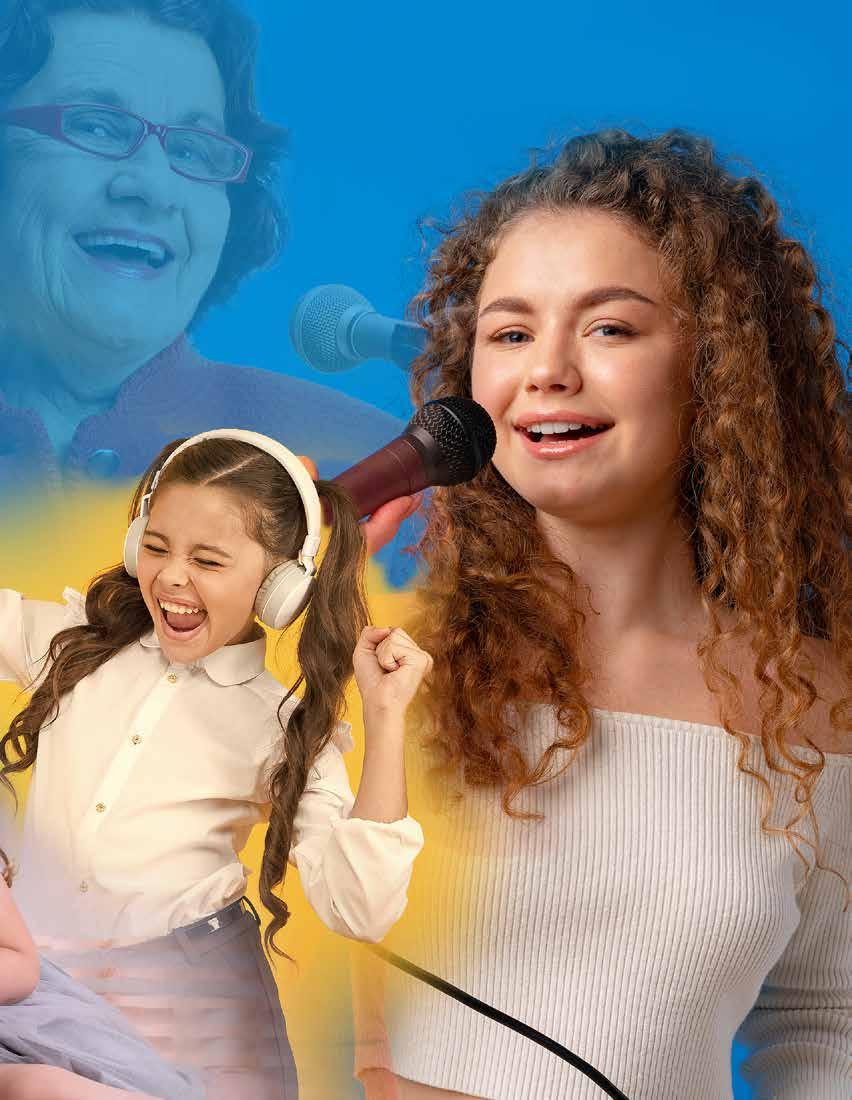
October 2022 35
Singing as a Life-Long Educational Endeavor
A starting point is honest instruction, like exists in math and English, and support and encouragement to continue in elective coursework. Conductors for singers of all ages must give accurate and constructive feedback, which helps the student accomplish two things: (1) improve weaknesses, and (2) improve strengths. Children and adolescents must be asked to sing individually or in small groups to develop the ability—and the confidence—to sing alone and with oth ers. When they do, they are deserving of effective, supportive “feedbacks” that improve their singing. When constructive feedback is balanced offered alongside the notion that anyone can learn to do it—just like in math and other subject areas— singers may be more inclined to continue participation into college and community choir years.
What does it matter if everyone can sing if no one wants to?
An emphasis on being in tune can be detrimental to the idea that everyone should enjoy singing when it suggests only “really good” singers should do it. This idea is at odds with the idea of teach ing and learning: to learn it you must not have known it before. Anecdotal evidence suggests westerners have the notion that only those deemed good singers should sing, but other cultures value singing whether it is deemed technically “good” or not. Indeed, our mainstream culture is a listener culture with a dividing line between the stage and the audience, and this rings true (pun intended) for classical and pop music alike. When artists like Brandi Carlisle sing with an orchestra, they sometimes invite the audience to participate; she leads them in not one
but in two or even three parts. Audience members like to sing—and can, which is often proven when they are invited to do it as part of a big crowd.
There is a great threshold in the tran sition between school-aged years and adulthood. Researchers in music partic ipation are now writing about how to lead in the 21st century, represented by two major ideas. First, what kinds of music practices encourage students to be capable readers and performers of music after schooling ends and there is no con ductor around to help? We might think seriously about when music reading is important in students’ futures (it is!), and when is it a hindrance. Secondly, there is a great pop music movement in the schools our singers attend, sometimes called the modern band movement, where music teachers are helping students to learn
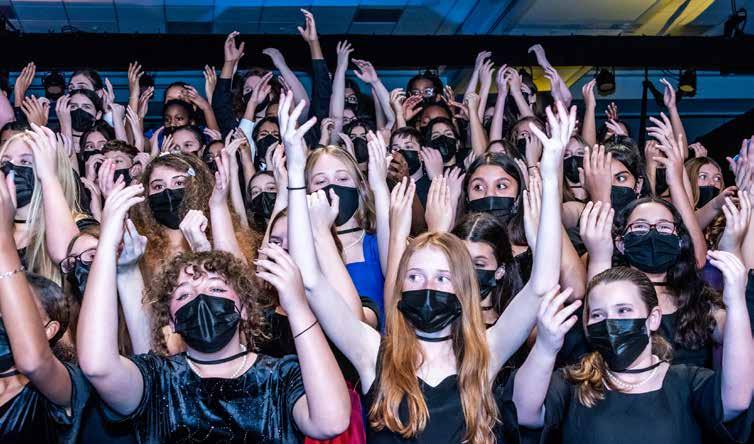
Continued from page 34 36 Florida Music Director
solo instruments like ukulele, guitar, and other instruments. Maybe we can intro duce tablature or the keys of the piano and at the same time make singing a priority, too.
Of course, the transition from high school to adulthood is a time of active deci sion making for individuals. Regardless of their intended major, some research suggests students make the choice to par ticipate in collegiate music ensembles well before they arrive on campus (McDavid, 1999). In another study, college partici pants saw themselves as better singers than those who chose not to participate in college, and some of them cited a general lack of information about musi cal opportunities on campus (Amundson, 2012). Importantly, some students may not have thought they were good enough to sing in college choir, which is unfortu nate: students still have to take math and English perhaps wondering whether they are good enough.
Nothing feels good like singing feels good.
There is a great deal of research on non-musical outcomes related to sing ing. Generally, taking music is associated with good grades, it offers links to being healthier, and it promotes social activity for people of all ages. For individuals with dementia, it means connecting to certain memories when others have disappeared. There is less research, though, on this aspect of singing: evidence of feeling good while singing. It feels great to take a deep breath of air and sing it back out. I contend it feels particularly good to sing loudly, whether on your own or by partic ipating in a choir.
Little is known about how people par ticipate simultaneously in different kinds of music-making, or even about how peo ple with music training of any kind go on
A final “Note”
Christopher Small thought of music not as a thing, but an activity (Small, 1998). To repeat, everyone can sing, and everyone should. What they used to call a “tin ear” is really a misconception: experi ence and instruction help us all to enjoy singing with our friends— the louder the better.
to be consumers of music (Nichols, 2015). Gates put forth that there are profession als and apprentices, and also amateurs, hobbyists, recreationalists, and dabblers (Gates, 1991), and he was always suggest ing everyone is musical. The more con ductors promote that everyone is musical (not just choristers) in the same way we can all write, read, and do math, the more students may see themselves doing musical activities as a part of their future selves.
Conductors may agree the ability to sing in tune is important, followed closely by the ability to sing out with tone that matches the genre. If life-long music-mak ing is a chief goal of conductors, the “curriculum” might include teaching stu dents about their individual ranges so they can identify songs that suit them or know in which keys to sing them. How to find a starting pitch, and even knowing on which pitch one is beginning, might be considered primary goals for singing in choir that could lead to individual music-making. This could be an import ant reason for introducing students to the keyboard: to be able to find one’s way around the piano keys, whether virtual or physical.
Finally, a large repertoire of songs may not be a sufficient curriculum agenda for younger or older children to promote continuing participation in music, even in singing. Learning folk songs from our culture and others, as well as patriotic or parochial music—for schools that deem it important—are worthy goals, but they must be paralleled by developing the ability to: (1) sing in tune, (2) find starting notes and suitable ranges for one’s own voice, and (3) invent harmony to sing
along with others. Singing is noble activ ity, and we conductors are the gatekeep ers to elective participation in secondary schooling and beyond.
Bryan E. Nichols, PhD, is a teacher and conductor at The Pennsylvania State University, where he leads the University Choir, teach es courses in music and edu cation, and directs the Pitch Exploration Lab. Dr. Nichols is a life member of the American Choral Directors Association and serves in leadership positions in ACDA and NAfME.
References
Amundson, B. (2012) Factors related to continued choral participation: A comparative study of participants and non-participants in college choir (Unpublished doctoral dissertation). University of Washington.
Demorest, S. & Pfordresher, P. (2015). Singing accuracy development from K-adult. Music Perception, 32(3), 293-302. https://doi. org/10.1525/mp.2015.32.3.293
Eldeib, D. (Feb. 18, 2015). Study: Singing more of a learned skill than natural talent. Chicago Tribune. https://www.chicagotribune.com/ news/ct-northwestern-singing-on-key-met20150218-story.html
Gates, J. T. (1991). Music participation: Theory, research, and policy. Bulletin of the Council for Research in Music Education, 109, 1-35. https:// www.jstor.org/stable/i40013225
McDavid, J. B. (1999) A study of factors influencing nonparticipation in collegiate band programs among first-year students in the Pacific-10 Athletic Conference (Unpublished doctoral dissertation). University of Washington.

Nichols, B. (2015). The musical participation and consumerism of two non-music majors enrolled in a university men’s glee club. Contributions to Music Education, 40, 131-146. https://www.jstor.org/stable/24711075
Small, C. (1998). Musicking. Wesleyan University Press.
Wolan, M. (Feb. 26, 2020). How to sing in tune. New York Times Magazine. https://www. nytimes.com/2020/01/21/magazine/how-tosing-in-tune.html
enh October 2022 37
FLORIDA MUSIC EDUCATION ASSOCIATION 2022-2023 DONORS
Thank you to all of the donors who have shown their dedication to the improvement of music education in Florida by supporting our Mission through financial contributions.
Our donors support specific causes by donating to the FMEA funds of their choice:
FMEA Scholarship Fund
Music Education Advocacy General Fund
June M. Hinckley Scholarship Professional Development for Members
Mel & Sally Schiff Music Education Relief Fund
The following have graciously donated to FMEA from April 1, 2022, through September 8, 2022.
MAESTRO’S CIRCLE
$10,000 and up
No current donors at this time.
ARTIST’S CIRCLE
$1,000 – $9,999
Clifford Madsen
SUSTAINERS
$100 – $999
Carlos Abril
In Honor of Dr. Nicholas DeCarbo
Lucinda Balistreri
In Honor of music educators in Sarasota
Christopher Banks
Kasia Bugaj
Dale Choate
Alice-Ann Darrow
In Memory of Mr. & Mrs. O.B. Darrow
Virginia Densmore
In Honor of Vicki Rhodes
Virginia Dickert
In Memory of Lindsay Keller & Debbie Liles
Kristin Greene
In Memory of Charles E. Inderwiesen, Jr.
Stanley Hoch
Dennis Holt
Frank Howes
In Memory of Richard Bowles & Harry Grant
Marsha Juday
Steve & Beth Kelly
Sheila King
In Memory of John W. King
Jason Locker
In Memory of June M. Hinckley
David Martinez-Cooley
Robert McCormick
Carolyn Minear
John Nista
In Memory of Stanley Dmitrenko
Mary Palmer
In Memory of Amy Catherine Palmer
David Pletincks
In Honor of Alexis & Jonathan Pletincks
Jeanne Reynolds
In Honor of Pinellas County Performing Arts Teachers
Mary Catherine Salo
In Memory of Gary Rivenbark & Wes Rainer
38 Florida Music Director
SUSTAINERS continued
Steven Salo
In Honor of John “Buck” Jamison & Dr. William Prince Kathleen Sanz
In Memory of June M. Hinckley
J. Mark Scott
In Honor of Dr. Andre Thomas, Dr. Judy Arthur, & Dr. Judy Bowers D. Gregory Springer Jeannine Stemmer
In Memory of Barbara Kingman & Lauren Alonso
PATRONS
$25 – $99
Michael Antmann
Judy Arthur
In Honor of Raymond Kickliter & Nancy Marsters
William Bauer David Bayardelle
On Behalf of Harry Spyker Richard Bradford
In Honor of William S. & Helen H. Bradford Greg Carswell
Blair Clawson
In Honor of Ginny Densmore, Alice-Ann Darrow, & Vicki Rhodes Dayna Cole
In Memory of Linda Mann Marc Decker
FRIENDS
up to $24
Crystal Berner
Laurie Bitters
Jessica Blakley
In Memory of John Rose Antonio Borges
Joseph Callaway
Gwendolyn Carroll Bethany Confessore Beth Ann Delmar Jodie Donahoo Revae Douglass Ross Denise Dumala
Christopher Dunn Monica DuQuette Debbie Fahmie Shelby Fullerton Michael Gabriel
Leiland Theriot
In Memory of Clayton Krehbiel Richard Uhler
Howard Weinstein
In Memory of Barry Weinstein
Donald West
In Memory of Ron Powell, Vista Audio Productions, Inc. David Williams
Marilyn Wirsz
In Memory of Bill & Shirley Head
Dewey Dodds
Judith Evans Scott Evans Bradley Franks
In Memory of Gary W. Rivenbark Julie Hebert Julia House
In Memory of Dr. Kimberle Moon McKee Monroe Lewis Joseph Luechauer Kevin Lusk Lloyd McIntyre
In Memory of Bob Hager Kim Miles Katie Grace Miller
In Honor of Artie Almeida Victor Mongillo
Ree Nathan Galen Peters Edward Prasse Melissa Rawls
Mark Stevens
Valerie Terry David Verdoni John Watkins Sondra Wenninger Collins Graeme Winder
On Behalf of all our hardworking music educators
Anonymous (3)
Tina Gill
In Memory of Gary Rivenbark Walter Halil James Hammond Angela Hartvigsen William Hazlett Jon Hutchison Jason Jerald Kathleen Kerstetter Mary Keyloun Cruz
In Memory of George Paul Keyloun Deborah Mar
In Dedication to Mrs. Barbara Kingman Kyle Matthews Katie McGuire Menges John Parris Hank Phillips
Amanda Quist
In Memory of Patricia Koning Diana Rollo Melissa Salek Ian Schwindt Joani Slawson John Southall Kelly Southall Eddie Steadman Andrea Szarowicz Mark Thielen Noiree Weaver Bradley Wharton Lindsey Williams Jennifer Zahn
Anonymous (10)
October 2022 39
Marc Decker, DMA, President

Now that we are in October, I hope you have settled into a familiar routine and are finding even more success in the classroom. Here are a few important announcements for the members of FCMEA.


The application deadline for the FCMEA Creative Explorations Grant is fast approaching on November 1. This grant is designed to support active FCMEA members who engage in research, cre ative activities, or other projects that align with the mission of
our association. Recipients can receive up to $1,500 in financial assistance. Visit the FCMEA website to learn more and apply: fcmea.org.

Florida NAfME Collegiate will host its Fall Conference on October 23 at Southeastern University. This conference is an important opportunity for college students to grow, connect, recharge, and prepare for their future careers. College teach ers throughout Florida, spread the word to your students and encourage them to attend. Florida NAfME Collegiate is the future of music education in Florida, and we must do everything we can to support them. Visit the Florida NAfME Collegiate website to learn more and register: flnafmecollegiate.com.
Finally, FCMEA will hold its annual fall business meeting virtually on October 23 at 3 pm. We have many important topics to discuss, and I look forward to seeing everyone as we work together for the betterment of our profession. An invitation link will be sent to the association’s membership.
I look forward to seeing you all and hope the remaining weeks of the fall term continue to be musically and education ally rewarding.
FLORIDA COLLEGE MUSIC EDUCATORS ASSOCIATION
40 Florida Music Director Component News
We promise it’s not magic even if it seems like it. Teaching your students to sight read is so easy, you’ll swear it’s magic. • Virtually infinite exercises for solo musicians & full ensembles • Integrations with Clever, Google Classroom, Canvas, Schoology & Classlink • Assess students with built-in Assignments feature & Practice Logs • Multiple levels of difficulty & customizable • Affordable - Teachers $35/year; student accounts starting as low as $2/student sightreadingfactory.com Go to sightreadingfactory.com/fmea1 to activate a free trial with student accts
Now that we are all into our school year and hopefully things are rolling well in our respective programs, I want to introduce a new FBA committee. The Health and Wellness Committee has been established to focus on the following:
« Promote healthy work-home life balance.
« Increase mental health awareness among the membership.

« Provide methods of recognizing and eliminating job-induced stress.
Bernie Hendricks, President
« Educate the membership on health-conscious perspectives/approaches to professional growth.
« Provide opportunities for the membership to interact and develop/strengthen camaraderie and relationships.
The chairperson for this committee is Dr. Dré Graham.

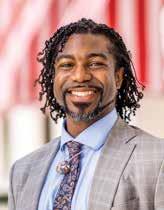
Here is a message from him:
Greetings, world changers. New to the committee opportunities list this year, the Florida Bandmasters Association would like to introduce you to our band-specific Health and Wellness Committee. While serving as an educator in our current societal climate comes with its own share of significant challenges, we know that being a band director exacerbates those toils exponentially and that it is incredibly easy to lose yourself in the sheer volume of responsibilities. From after-school rehearsals to Friday night football games to weekend instrument tryouts and checkouts, we selflessly sacrifice ourselves to ensure the students within our care have every opportunity to encounter a life-changing music education experience. But to what end? In the same way that a vehicle with no gas is unable to fulfill its purpose of providing transportation, we as educators are incapable of making our full impact without being the best version of ourselves. In order to do that, it is imperative that we practice and demonstrate the same self-care we preach to our students every day, and that’s what this committee is here to do. Throughout the course of this year, we want to take opportunities to engage in transparent conversations about the challenges and victories of our profession, to develop strong self-care habits, to explore new ways of relieving stress in healthy ways, and to connect with other band directors who are standing on the front lines. Iron sharpens iron, and we as a unit are stronger together. Whether you love working out in the gym, cuddling up with a good book, or hanging with friends at a local establishment, camaraderie and compan ionship is one of our strongest tools for success. We will work to leverage this strength to ensure that we all experience what it means to be successful. You. Can. Do. It!
Ultimately, not just as music educators, but as band directors, we must understand one fundamental truth: YOU matter! What you do day-in and day-out matters! YOU are here on purpose, for a purpose, for such a time as this! YOU will never know what your presence means to your students. YOU are the reason why many students muster the strength to come to school. YOU make a difference! But in order to continue doing that, you must remember to make yourself a priority. Strong mental and physical health practices paired with a level and healthy perspective on what is truly important are the keys to longevity and the ability to outlast any of the crazy that is thrown our way. You’ve got this! But more importantly, you are not alone. We are here for you, and we look forward to continuing to build our capacity moving forward. Onward and ever upward!
Musically yours, Dr. Dré Graham
Dr. Dré Graham, Chairperson
FBA Health and Wellness Committee 2020 Florida Teacher of the Year
FLORIDA BANDMASTERS ASSOCIATION
October 2022 41
FLORIDA VOCAL ASSOCIATION
 Jeannine Stemmer, President
Jeannine Stemmer, President
It is our job as music educators to make sure our students walk out of our class knowing more about the musical expe rience and being better than they were when they came in. For that degree of learning to take place, we must be inten tional in every situation.
When I was in high school, the seniors took a trip to Europe at the end of their senior year. When it was my turn, my mom took extra tutoring jobs and baked and sold brownies every day so I could go. Everyone in the family chipped in. It was a big deal. As I boarded the plane on that day I had been waiting for, I started to feel sick. My throat hurt, and I felt very weak. I knew it was more than the aver age cold, but it didn’t matter. I was going to Europe!
When we finally landed in London, I realized I had sores in my throat, and it became very hard to eat. Day 2 in London and my chaperone, Mrs. Martin, who by the way is still my hero and the example of who I want to be for my stu dents, stayed in the hotel room with me and called the doctor. We discovered I had mononucleosis. Don’t worry, I wasn’t kissing anyone at the time. I asked the doctor to give me whatever I needed so I could get out of bed and enjoy my friends and Europe. I knew at that moment I had to suck it up and enjoy my time because I
would not get that moment back. I skied cross country from Munich to Italy, had French onion soup at the top of the Eiffel Tower, visited Neuschwanstein Castle, toured Dachau, and much more.

As the years went on, I realized I need ed to be intentional in all the moments, not just the big ones. From the mundane
to the rare, no matter how sick or tired I felt, every moment would be an opportu nity for growth.
Fast-forward 20 years and I am teach ing my senior high beginning treble choir. Occasionally, I like to pick on a stu dent and tell him or her why he or she is awesome. On one particular day the bell rang, and as everyone was leaving, one student asked, “What would you have said about me?”

As my brain was running low on ideas, words, and energy, playfully I respond ed, “I’m glad I ran out of time because everyone would have known you are my favorite.” Her eyes watered as she told me, “I have never been anyone’s favorite.” It was an organic moment, not forced, but it was definitely intentional. I needed to make sure the moment mattered for both of us. By being intentional, I learned a lot about her and how she felt.
The greater lesson here is that the small moments are the ones we spend our lives doing. Europe was great, but it was only once. Beginning choir is every day, and these are the experiences that define us.
Let’s circle back to Mrs. Martin. I have never forgotten the comfort she provided that day. She was intentional about mak ing sure that in that moment I was OK. Thank you, Mrs. Martin.
42 Florida Music Director Component News Print. Digital. Direct.
FLORIDA ORCHESTRA ASSOCIATION
Laurie Bitters, President
I’msure it seems as though time is flying by as many of you are grading performance pass-offs and preparing for your fall concert. Or maybe you are in the throes of selecting solo and ensemble music. Whatever your lot, life certainly has its way of pausing our agendas, doesn’t it? We have survived the begin ning of the school year, all-state audi tions, and our yearly favorite—all-state hotel reservations. Now you can take a moment to sit back and reflect on the first couple months of school and see that you have accomplished something amongst all of the beginning of the year “must-do’s.”
of preparation our students put forth to participate. I hope to see you there. Once the all-state results have been posted, please release any hotel rooms you will no longer need to help those who may still need to reserve rooms.
As always, I want to encourage you to create a culture of leadership in your classroom and enlist the help of your stu

dents. I am continually amazed at their potential, not only musically but also administratively. We certainly have the power to cultivate an enriching learning environment, in hopes of yielding better citizens and perhaps even future music educators. Wishing you the best on your fall concerts!
FLORIDA ELEMENTARY MUSIC EDUCATORS ASSOCIATION
Joani Slawson, President
Florida Orchestra Association & Florida ASTA Fall Conference 2022
Greetings,
Thursday and Friday, October 6-7, 2022
Keynote Speaker & Guest Conductor: David Eccles
Many sessions with information you can use now!
FOA and FLASTA Business Meetings
Two New Music Reading Sessions (Bring your instrument and stand!) Vendor Exhibits & Networking
Orchestra Association & Florida ASTA Fall Conference 2022 and Friday, October 6-7, 2022
wonderful elementary music teachers! I hope you have been able to make beautiful music with your students so far this year. Have you noticed that students seem to be taking longer to process information and/or to follow directions? The pandemic has definitely impacted student learning. I am learning, though, to meet students where they are.
6001 Destination Parkway Orlando, FL 32819 (1-888-488-3509)
Resort fee entitles you to:
I certainly hope as you are looking at your schedule, you are planning to attend the FOA Fall Conference on October 6-7. We look forward to hear ing from David Eccles, our keynote speaker. Other sessions will pres ent ideas on conducting techniques, new music reading, and a jam session, to name a few. Take advantage of the time you have at lunch and dinner to talk and visit with other directors. Sometimes in sharing our situations and issues, we discover we are not alone in what we are doing. You may hear that quick fix or idea you hadn’t thought of before.
• 15% discount at all hotel restaurants (except the
Ask for the FOA room rate: $175.00 (single or double); $13.00 per day resort fee

Hotel reservations must be made by Saturday, Sept. 22, 2022!
Preregistration Fee: $75.00 Orchestra Teachers/ASTA Members; $45.00 Retired/Spouse; $15.00 Collegiate
On-Site Registration Fee: $100.00 Orchestra Teachers/ASTA Members; $60.00 Retired/Spouse; $25.00 Collegiate
Preregistration must be postmarked by Sept. 16, 2022.
Session details and additional information can be found at www.myfoa.org!
Name Home Phone
I have been excited about my beginning of the year lessons. I have third and fourth grade students doing Music in Space, which incorporates pictures from the James Webb tele scope. They have practiced space rhythms and are now creating their own music inspired by the universe. These lessons are taking more time than I thought, and my first reaction was to wonder how I was going to get through all my lessons this year. After some reflec tion, I realized that pushing through lessons just because we were able to get through them faster in the past is not beneficial to my students. I am striving to focus on meeting the needs of my stu dents where they are right now. I have also reminded myself that building their musical foundation and fostering their love of music is the most important part of my job. As long as my students are experiencing music in every class, the pace is a secondary concern.

Ask for the FOA room rate:
$175.00 (single or double); $13.00 per day resort fee
Hotel reservations must be made by Saturday, Sept. 22, 2022!
On October 22, we will be doing all-state judging in Orlando. Please con sider helping with the all-state audi tion selection. It is an experience we all should have to truly understand the level
Preregistration Fee:
$75.00 Orchestra Teachers/ASTA Members; $45.00 Retired/Spouse; $15.00 Collegiate

On-Site Registration Fee: $100.00 Orchestra Teachers/ASTA Members; $60.00 Retired/Spouse; $25.00 Collegiate
Address City State ZIP School Name Email
We are fortunate as elementary music teachers to have our students in our classes for years. This year, I am committing to meet my students where they are and not where I think they should be. Let us use these precious moments to connect with our students and to share our love for music.
Please place the quantity of those registering in each appropriate box:
Preregistration must be postmarked by Sept. 16, 2022.
FOA & ASTA Member
ASTA Member (only) Retired/Spouse Collegiate

October 2022 43
Component News
Fall Conference is back!
FLORIDA NAfME COLLEGIATE Mark A. Belfast, Jr., PhD, Advisor

It’s
October in the Sunshine State. That means it’s time to grab your most pro fessional pair of Crocs and socks, pile into the most fuel efficient vehicle you can find, and take a road trip to Southeastern University in Lakeland for the Florida NAfME Collegiate Fall Conference! I hope
you and your chapter members have been hyping up the event during your meet ings because you won’t want to miss it. I am so excited to hear from our incredible lineup of presenters because I know I will learn things that will make me a better educator. What better way to put wind
in your sails at midterms than to gather with colleagues from around the state and learn from some of the most talented and successful educators in our profession?
As you’re preparing for your trip, here are a few things to remember:
« Keep an eye on your email, social media, and the Florida NAfME Collegiate website for conference updates.
FLORIDA NAfME COLLEGIATE
Allison Yopp, President

Iam a freshman music education major, and I am freaking out!
First, the freak-out that comes with your first semester of college is a normal and natural process all freshmen go through, especially music education majors, as the amount of information we receive in the first semester can be overwhelm ing. Stepping into your first education class, and then your first music class, and then your first lesson, and then your first ensemble might send you running for the hills. It does feel a little like the first time you learned how to swim. You were terrified you were going to drown the entire time you were in the water, but once you got the hang of it you were a pro. I am here to tell you that you will get the hang of it.
The best advice I can give you is to lean on those around you and to stay organized. You will come into contact with many music education majors as you begin college. Do not be afraid to let them know how you’re doing. The great thing about this degree is we all have been in your shoes at one point. So even though sometimes starting out can be exhausting and you feel alone, just know there are people around you who probably feel the exact same way.
Another thing to look forward to is you will receive an in-depth education, not only learning how to improve yourself as a musician but also learning how to become a teacher. That comes with many classes and lessons that are varied and beneficial. Take time to dig into the information being taught because one day everything you learn will be put into practice when you are a teacher.
You will learn more about yourself in the next four years than you ever thought was possible, and that is exciting. For some of you, for the first time ever, you are making your own decisions and stepping into this next chapter of life, learning what being an adult is all about. Remember, there will be days when you feel like you were thrown into the deep end, but you will learn how to swim. All the big scary things you feel right now will not be as scary as you grow.
I hope all of you continue your fall semester strong. Know we are all here to provide support wherever support is needed!
« Be sure to renew your FMEA member ship and register for the conference.
« Don’t let finances be the reason you don’t attend. Talk to your chapter officers or contact the state executive board about membership, conference housing, and registration scholar ships.
« You’re going to meet lots of profes sional educators, and ALL of them can help you get a job. Bring your A-game!
« If you’ve got a tablet, like an iPad, bring that too. It could be useful during our digital music session.
« Make lasting memories! Document your road trip on social media, and be sure to tag @flnafmecollegiate.
« Haste makes waste, and speed kills. Please be careful! 10 & 2. Eyes on the road. Use your blinkers, etc.
Advocate for music education and invite everyone you know. Have you invited your faculty advisor, department chair, or dean? Why not? Do you know a music lover who isn’t a music education major? Bring them with you! Just shoot me an email (mabelfast@seu.edu), and we’ll work some registration magic. Our profession desperately needs all of you, and MORE!
Sunday, October 23, is going to be another great day for music education in Florida. I can’t wait to see you at this year’s Florida NAfME Collegiate Fall Conference!
44 Florida Music Director
Please take time to thank and support our 2022-2023 Corporate Partners.


GOLD PARTNERS
Bornoff Foundation for the Advancement of String Education (FASE, Inc.)


SILVER PARTNERS
Mark Custom Recording Service, Inc.


BRONZE PARTNERS
Eastman Music Company Head’s House of Music Meloquest, Inc.


Music Man, Inc. Orlando Sings West Music Company
Partners as of September 8, 2022. *Please visit FMEA.org/partners for partnership details or call 850-878-6844.
October 2022 45
Committee Reports
The Media’s Influence on Our Perceptions of People With Disabilities
The media have incredible power to influence our perception of others, particularly those we do not know per sonally—such as political candidates or underrepresented groups with whom we have limited contact. The television and film media have long been criticized for stereotyping certain minority groups (Cottle, 2000). Blacks, Asian Americans, persons with disabilities, members of the LGBTQ+ community, and even women have all struggled to gain greater own ership of how they are portrayed in the media. Popular films have been found to reflect certain biases in their portrayals (Cones, 2012). Consequently, it is import ant to remember the media are not always accurate in their portrayals of “others,”
and it is the consumer who must question and challenge media depictions.
The media, films in particular, are many consumers’ primary information source about disabilities. Though 61 mil lion Americans live with a disability, many other Americans do not have a close friend or relative with a disability and consequently rely on the media to educate them about disabilities.
What we see on screen influences how we act in real life, and how we act is dependent on filmmakers choosing to include individuals with disabilities in diverse and accurate portrayals. Thus, when just 2.3 per cent of the 100 top-grossing films
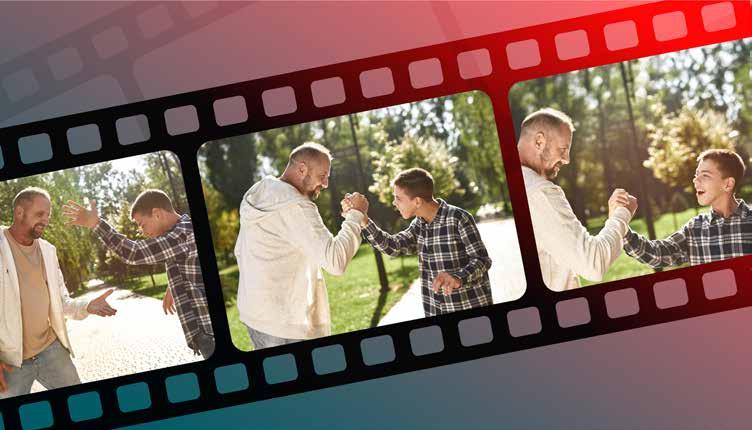
include speaking characters with dis abilities, the disability community is pretty much erased on screen. When filmmakers choose to include char acters with disabilities, they can help to remove the stigmas that currently exist about interacting with individ uals with disabilities. (Appelbaum, 2020, para 4).
Social media, such as Facebook and Instagram, and print media—People mag azine in particular—are other informa tion sources about disability. Analyses of social media posts or opinions expressed about the posts provide a lens to explore perceptions of disability. Since younger populations tend to use social media to
46 Florida Music Director
SOCIAL JUSTICE & DIVERSE LEARNERS COMMITTEE Alice-Ann Darrow, Chairperson

a greater extent than older populations, it is possible to capture students’ per spectives of disabilities. Social media are used by students with disabilities as well; consequently, they are able to respond to their online representations through posts, comments, and videos of their own (Heideman, 2015).
Research on the Media’s Influence
Various researchers have examined how disability is depicted in the media, both in print and film, and how these rep resentations can unwittingly victimize and stereotype individuals (Darrow, 2011; Darrow & Loomis, 1999; Haller, Dorries, & Rahn, 2006). Researchers investigating sentiments toward people with disabil ities generally ask participants to refer ence a hypothetical individual with a disability (Barr & Bracchitta, 2015; Darrow & Johnson, 1994) or fictitious characters (Darrow, 2011; Darrow & Loomis, 1999) rather than authentic individuals found
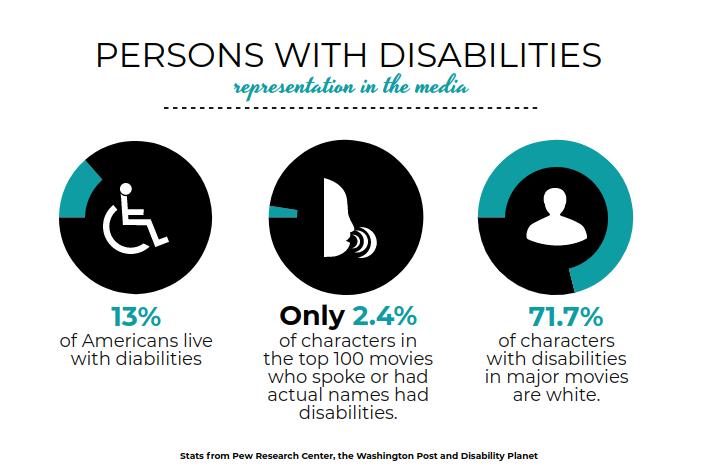
in the media. Real people with disabilities are often the subject of Facebook pages such as People with disabilities rock or This Is What It Looks Like. Captions that accom pany posts and comments written below posts provide useful data to explore how the media influence perceptions of people with disabilities.
In a study designed to determine whether comments on Facebook posts about people with disabilities fit the “inspiration porn” narrative, Gagliardi (2017) analyzed comment threads on three sets of Facebook posts. Each set con sisted of two posts: one depicting a person with a disability and another depicting a person without a disability, both engag ing in similar activities. Sentiment anal ysis was used to identify and compare the strength of emotion expressed across the comment threads in each dataset, and content analysis to count and com pare mentions of the word-stem inspir and other terms relevant to inspiration porn. These analyses were used to inves tigate whether Facebook users were more
 Graphic by Charlotte Alden.
Graphic by Charlotte Alden.
likely to use an “inspiration” frame to respond to people with disabilities than to people without disabilities engaging in similar activities. Results revealed (1) the emotional strength of language used in Facebook comment threads about people with disabilities was greater than those about people without disabilities, and (2) hyperbolic and religious language was used more often in reference to persons with disabilities than to those without disabilities.
Musical Media
The media continue to be a public infor mation source about disabilities, and the arts are an important part of the media. As an integral part of the arts community, music educators must be mindful of how those with disabilities are portrayed in the arts. Darrow (2011) examined selected lyrics related to disability in the popular Broadway musical Wicked. The lyrics were analyzed and placed in the context of disability literature, common disability
October 2022 47
Continued on page 48
Committee Reports
SOCIAL JUSTICE & DIVERSE LEARNERS COMMITTEE
stereotypes, historical and contemporary uses of disability as a metaphor in film and literature, and portrayals of persons with disabilities in the popular media— specifically the arts. She found stigmatiz ing views of disability that included pity, self-pity, dependence, bitterness, resent ment, loneliness, and wickedness.
Darrow (2012) also examined Glee, a popular television show (2009-2015) about a school choir and the adventures of its members. She found stigmatizing depic tions of disability, but also misinforma tion about disabilities, such as in the epi sode The Purple Piano Project, when a new character, Sugar Motta, enters the practice room with the line, “I have self-diagnosed Asperger’s, so I can pretty much say what ever I want.” The freedom to say whatever one wishes is not a characteristic of autism spectrum disorder, which is diagnosed by a professional after extensive observa tions of a student and interviews with parents, teachers, and others who interact with the student on a regular basis. While likely unintentional, early episodes of Glee prompted numerous scholarly and online commentaries regarding its missteps in representing persons with disabilities (Darrow, 2012; Elber, 2009).
Changing Perceptions
In the popular media as well as our professional media, we need to draw an accurate and balanced portrayal of dis ability as a part of everyday life. We can present disability in a way that dispels negative stereotypes by reflecting the real lived experiences of people with dis abilities. Film and television have made progress in depicting people with dis abilities; however, Neilson (2021) report ed that advertisements rarely show dis abled people in everyday life, such as
working, parenting, or engaging in household chores. In an analysis of nearly 450,000 primetime ads on broadcast and cable TV in February 2021, just 1% includ ed representation of disability-related themes, visuals, or topics (Neilson, 2021).
Like advertisers, professional organi zations have not always been inclusive in their use of images and portrayals of persons with disabilities. Professional organizations might consider examin ing their marketing media to determine if persons with disabilities and other minority groups are adequately repre sented. Taking the opportunity to incor porate people with disabilities and other underrepresented groups into everyday brand messaging sends a valuable mes sage to the membership and others that all groups are welcomed and valued. The media and professional organizations can all help to break down social stigmas around disability by making people with disabilities and other minorities more vis ible. Inclusive marketing sends a message that an organization welcomes diversity.
Send It Rising, a digital marketing com pany, offers some ways to feature diverse marketing on social media platforms:
« Include a variety of races, sizes, and body types in your image posts and ad campaigns.
« Highlight critical civil rights mile stones like Juneteenth and Pride Month.
« Invite a diverse group of members to share their stories about the organi zation.
« Collaborate with diversity organiza tions.
« Use gender-neutral language.
« Talk about the causes the organization supports to show its commitment to social justice. (Send It Rising, 2022).
Students, and young adults in gen eral, are some of the most active con sumers of popular media, and t heir consumption is likely to increase as new technologies are created (Lenhart, 2015). Media images speak loud ly; consequently, t he media’s images, myths, and narratives play an import ant role in the socialization of our youth. Unfortunately, media depictions of persons with disabilities are rarely written or portrayed by persons with disabilities, thus making such depictions subject to the non-disabled perspective (Haller, Dorries, & Rahn, 2006). It is unlikely that authentic disability por trayals will be found in films or on social media until there are more people with disabilities hired as writers, directors, and social media administrators. When members of a minority group speak up about their image in the media, con sumers and executives generally listen.
The media can play a vital role in raising awareness and countering stig mas and misinformation about people with disabilities. Schools’ and organi zations’ social media have the power to change misperceptions about students with disabilities and other underrep resented groups by presenting them as part of the mainstream of student life. Yearbooks, school newspapers, school websites, service clubs, special interest organizations, and musical ensembles can all ensure that students with dis abilities are visible in school media and seen as active and valued participants in school life. By increasing awareness of students with disabilities and other classmates from diverse backgrounds, the media can actively contribute to the effective and successful integration of all students.
Continued from page 47 48 Florida Music Director
EMERGING LEADERS COMMITTEE
Mary Palmer, EdD, Chairperson

There is nothing quite like the start of a new school year. What are your words to describe it? Exciting, exhilarat ing, filled with promise, hopeful, or maybe scary, daunting, overly challenging, lonely?
I think of my “favorite teachers.” What gave them that esteemed moniker? Even at a young age, I recognized that they cared about me and all their students. I remember my teachers as always being there with encouragement and support. Today’s students need and deserve that support. More than ever, YOU are needed. It’s hard for me to imagine the struggles that we know many of our stu dents endure. Your acceptance of each of those students as they are will make a life-long difference. “Belonging” is essential … and music is often a place that provides that life-changer.
You, dear FMEA Emerging Leaders and other colleagues, can be the change agents who will make our world a better place. Live in the now, share your gifts, and make a difference. Be your best self as a teacher, a colleague, and a positive force in your school, in your own family, and in your community. Our world needs YOU.
I look forward to working together as we shape our part of the FMEA Professional Development Conference in January.
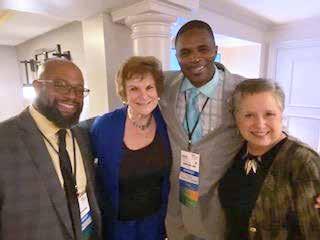
In this new year—this new start—enjoy every moment!
Check out this photo gallery to get a glimpse of what our 2023 FMEA Emerging Leaders are doing to continuously make a difference.
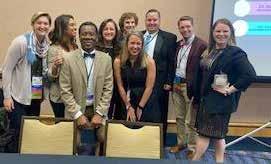
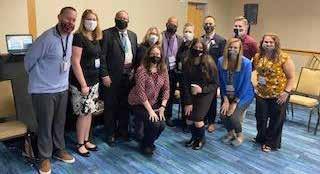
Happy New Year!
References
Appelbaum, L. (2020, September 24). Annenberg study shows significant increase of leads/co-leads with disabilities in topgrossing films. Respect Ability Newsletter Retrieved from https://www.respectability. org/2020/09/annenberg-study-disabilityfilm/
Barr, J. J., & Bracchitta, K. (2015). Attitudes toward people with disabilities: The effects of contact with different disability types. Current Psychology, 34, 223-238.
Cones, J. W. (2012). Patterns of bias in Hollywood movies. New York City, NY: Algora Publishing.
Cottle S. (Ed.) (2000). Ethnic minorities and the media: Changing cultural boundaries Philadelphia, PA: Open University Press.
Darrow, A. A. (2011). What’s so wicked about Wicked? Florida Music Director, 64(6), 14-18.
Darrow, A. A. (2012, November). Keynote address: No Glee for students with disabilities, FL American Choral Directors Association, Lake Mary, FL.
Darrow, A. A., & Johnson, C. M. (1994). Junior and senior high school music students’ attitudes toward individuals with a disability. Journal of Music Therapy, 31, 266279.
Darrow, A. A., & Loomis, D. M. (1999). Music and deaf culture: Images from the media and their interpretation by deaf and hearing students. Journal of Music Therapy, 36(2), 88-109.
Elber, L. (2009, November 10). Glee wheelchair episode hits bump with disabled. Rome News-Tribune. Retrieved from https://www. northwestgeorgianews.com/rome/news/ glee-wheelchair-episode-hits-bump-withdisabled/article_99310349-b840-5d77-9bb4e7492ac7dc95.html
Gagliardi, K. (2017). Facebook captions: Kindness, or inspiration porn? M/C–A Journal of Media and Culture, 20(3). Retrieved from http://journal.media-culture.org.au/ index.php/mcjournal/article/view/1258
Haller, B., Dorries, B., & Rahn, J. (2006). Media labeling versus the U.S. disability community identity: A study of shifting cultural language. Disability & Society, 21(1), 61-75.
Heideman, E. (2015, February 2). Inspiration porn is not okay: Disability activists are not impressed with feel-good Super Bowl ads. Salon.com. Retrieved from https://www. salon.com/2015/02/02/inspiration_porn_ is_not_okay_disability_activists_are_not_ impressed_with_feel_good_super_bowl_ ads/
Lenhart, A. (2015). Teens, social media & technology overview 2015. Washington, DC: The Pew Research Center.
October 2022 49
Committee
Whether you are new to FMEA or a longtime member, I would like to remind you that the light of FMEA, the FMEA Awards Program, is an integral part of our organization and our annual conference, connecting all areas of the FMEA membership as well as admin istrators, district leaders, school board members, music industry leaders, NAfME and FMEA leaders, and the community. FMEA takes a special moment during the conference to celebrate individuals who have made outstanding contribu tions to music education—who have been brave enough to see and to be the light. The awards ceremony also plays a piv otal role in music advocacy for all those who attend. It’s a great way to showcase amazing music education models and to advocate for the exemplary music edu cation programs and partners we have throughout the state.
 AWARDS COMMITTEE Sondra A. W. Collins, Chairperson
AWARDS COMMITTEE Sondra A. W. Collins, Chairperson

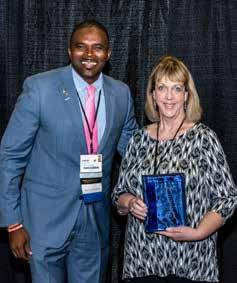
Are you part of a middle school or a high school music program that offers dynamic music instruction with high recruitment and retention numbers? If so, you can be a part of this year’s awards program by applying for the FMEA Enrollment Award. Applications should be made following a school’s FTE count in October. To qualify, 30% at the high school level and 45% at the middle school level of the entire school’s population must be involved in a music program taught by an FMEA member. Because FMEA honors and encourages alternative music courses that are so inviting to many of the talented, yet nontraditional, young musicians out there, I hope we will see those alternative music courses reflected in the schools that are recognized with the FMEA Enrollment Award this year. With such a large shift in music educa tion during the pandemic, you all surely have been exemplary in execution of new ideas in teaching music and the overarch ing change in music education delivery. It’s time to award you. If you know of a school that is offering nontraditional music courses alongside quality band, chorus, and orchestra courses, please

50 Florida Music Director
Reports
NOMINATIONS DUE OCTOBER 31 Music Education Service Award Middle School/ High School Enrollment Award FMEA Awards Like what you hear? And now you wonder how YOU can be involved with the FMEA awards?
invite them to take a look at the criteria for the FMEA Middle School/High School Enrollment Award. Applications for this award are due on October 31.
Have you been teaching music for 25 or more years? If so, you qualify for the Music Education Service Award, and the application process is very simple. If this is you, I’d like to give you a gentle nudge to submit your application so you can be part of the exciting awards ceremony in January. This is YOUR moment to be brave enough to be the light. Remember that these awards rightly give you the credit you deserve for your service to music education. We want to celebrate YOU! This application is due October 31. FMEA also has a very spe cial award that honors those reaching the mark of 50 years of service in music education. And if you know of someone who has stayed active with FMEA into his or her retirement years, we want to honor this colleague’s service. Please let me know who these folks are, and I will personally follow up with them (must hold retired or current membership in FMEA). It is such a highlight of our awards ceremony when we can recognize and honor the legends among us.
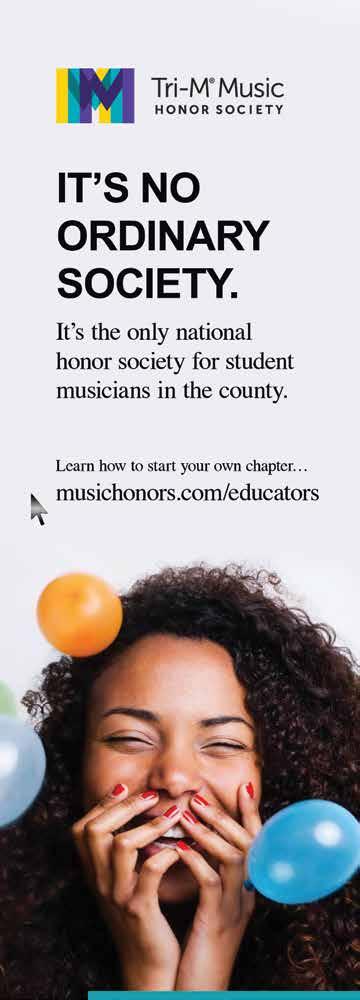
The school enrollment and music education service awards are typically self-nominated and the applications take only minutes to complete online. If you qualify in one of these cat egories and are thinking you don’t have the time to submit an application, think again. It takes somewhere between 5 and 15 minutes to submit this user-friendly application online. You can do this! The deadline for the Music Education Service Award and the Middle School /High School Enrollment Award categories is October 31, 2022. All applications are completed and turned in online. Please check the FMEA website for details about the nomination process.
I look forward to celebrating with YOU and all the 2023 FMEA award recipients at our FMEA Professional Development Conference in January!
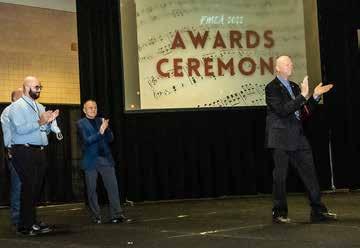
October 2022 51
ResearchPuzzles FOR MUSIC TEACHERS
 William I. Bauer, PhD FMEA Research Committee Chairperson, University of Florida
William I. Bauer, PhD FMEA Research Committee Chairperson, University of Florida

Including Popular Music in the Music Curriculum via Modern Band
In the summer of 1967, the Music Educators National Conference (now the National Association for Music Education, NAfME) sponsored a meeting in Tanglewood, Massachusetts, to examine the role of music in the society of the United States, while also considering how music teaching might be improved. Among the outcomes of the Tanglewood Symposium was the Tanglewood Declaration, eight statements that summarized beliefs about music in education, agreed upon by the symposium’s participants. The second of these statements read:
Music of all periods, styles, forms, and cultures belongs in the curriculum. The musical repertory should be expand ed to involve music of our time in its rich variety, including currently popular teenage music and avant-garde music, American folk music, and the music of other cultures. (Choate, 1968, p. 139).
Since that time, music educators, researchers, and others have debated the value and role of popular and other forms of vernacular musics in music education.
In recent years, a prominent approach to including pop ular music in PK-12 and higher education has been through an ensemble often designated modern band. Popularized by an organization called Little Kids Rock (littlekidsrock.org), modern band seeks to engage students in the study and per formance of popular music, including improvising and writing songs and using instruments such as keyboard, bass, drum set, guitar, ukulele, and various types of technology like digital audio workstations (DAWs). Music researchers have begun to investigate a variety of aspects of modern band. Music educator and researcher Bryan Powell summarized and synthesized the existing research in a recent article published in the NAfME journal Update: Applications of Research in Music Education (Powell, 2021). Powell organized the research he reviewed into five categories: (1) informal learning and nonformal teaching, (2) perspectives of modern band students, (3) perspectives of modern band teachers and modern band professional develop
ment, (4) modern band’s impact on school music participation, and (5) critiques of modern band.
Informal Learning and Nonformal Teaching
In modern band classes, the learning process is primarily student-centered with the teacher taking on the role of a facil itator; this is considered nonformal teaching. Students may learn informally from each other and usually have some choice in the repertoire to be performed. Aural learning is prominent. Students engage in an integrated experience of listening, per forming, improvising, and composing. Learning in modern band is considered an authentic, real-world process, as the ways that popular musicians learn outside of school settings, for example, in garage bands, are prioritized (Green 2002, 2008). Byo (2018) described modern band as being “positioned between the extremes of formal and informal learning, process and product orientation, and teacher- and student-centered pedagogy” (p. 259).
Perspectives of Modern Band Students
Researchers have found that there may be a gender bias favor ing males in popular music studies, including modern band. Overall, students have reported that participation in modern band has positively influenced their musical, social, emotional, and academic skills. They also indicated that modern band par ticipation helped develop their interpersonal skills, enhancing their ability to collaborate and get along with others. Finally, many modern band participants have stated that they continue to be active musically after graduating from high school.
Perspectives of Modern Band Teachers and Modern Band Professional Development
Randles (2018) found that the most prominent instrument used by modern band teachers was acoustic guitar, followed by vocals, electric guitar, bass guitar, and drum set. In the same study, 66% of the teachers indicated that they allowed their students to choose songs to perform. Some researchers
52 Florida Music Director
have pointed out that if the study of popular music in PK-12 schools continues to grow, collegiate music teacher education programs may need to rethink the curriculum to properly pre pare preservice teachers for employment. In-service teachers who are interested in offering popular music experiences for their students often need professional development to develop their skills and understanding in this musical subdiscipline. Teachers who have experienced such professional development report its benefits as including “improved aural skills, stronger orientation toward student-centered learning experiences, and reengaging with music making for fun…” (Powell, 2021, p. 42).
Modern Band’s Impact on School Music Participation

Researchers have found that the inclusion of modern band in music curricula not only has increased the number of students enrolled in school music classes but has also helped to diver sify student participation in terms of race and socioeconomics (Clauhs & Cremata, 2020). Importantly, there is no evidence that offering modern band classes negatively impacts enroll ment in traditional ensembles (i.e., band, orchestra, choir). Some researchers have also found that students with devel opmental disabilities may be well-served by modern band programs, as accommodations can be readily made.
Critiques of Modern Band
While researchers have found many benefits to modern band programs, the movement has not been without its critics. Some authors have pointed to the gradual integration of jazz ensem bles into school music programs in the 1970s and 1980s as a warning about what could happen with popular music. When jazz ensembles became an accepted part of school curricula, they were often taught in a manner similar to concert bands and orchestras instead of in ways authentic to jazz music (e.g., a focus on improvisation). Music educators need to
ensure that a similar situation doesn’t occur with popular music ensembles, where informal learning practices are the norm among popular musicians. Other researchers have been critical of the influence of the Little Kids Rock orga nization on the modern band movement and music educa tors’ acceptance of the principles and practices employed in teaching modern band classes without adequate con sideration of the implications. For more details about the research on modern band, access Powell’s (2021) article in the journal Update: Applications of Research in Music Education from the NAfME website, a free benefit of your FMEA/NAfME membership.
References
Byo, J. L. (2018). “Modern Band” as school music: A case study. International Journal of Music Education, 36(2), 259-269. https://doi. org/10.1177/0255761417729546
Choate, R. A. (Ed.) (1968). Documentary report of the Tanglewood Symposium. Music Educators National Conference.
Clauhs, M., & Cremata, R. (2020). Student voice and choice in modern band curriculum development. Journal of Popular Music Education, 4(1), 101-116. https://doi.org/10.1386/ jpme_00016_1
Green, L. (2002). How popular musicians learn: A way ahead for music education. Ashgate.
Green, L. (2008). Music, informal learning and the school: A new classroom pedagogy (Ashgate Popular and Folk Music Series). Ashgate.
Powell, B. (2021). Modern band: A review of literature. Update: Applications of Research in Music Education, 39(3), 39-46. https:// doi.org/10.1177/8755123320988528
Randles, C. (2018). Modern band: A descriptive study of teacher perceptions. Journal of Popular Music Education, 2(3), 217-230. https://doi.org/10.1386/jpme.2.3.217_1
Email your questions and feedback to wbauer@ufl.edu with a subject heading Research Puzzles.

 This on-going column seeks to stimulate awareness of research issues for FMEA teachers and researchers.
This on-going column seeks to stimulate awareness of research issues for FMEA teachers and researchers.
October 2022 53
ExecutiveDirector’sNotes
Things to Do This Fall
Unity in Music Education: Building Communities One Note at a Time
Preregistration is open for the 2023 FMEA Professional Development Conference Unity in Music Education: Building Communities One Note at a Time: https://fmea.org/conference/ Be sure to take advantage of this excellent conference in Tampa, January 11-14, 2023. The FMEA leadership and staff are looking forward to seeing everyone at the conference.
The FMEA hotel block opened on September 24. The room block fills up quickly, but there will be a release of rooms throughout the booking period so remember to check weekly for rooms that become available. Please note that the deadline to cancel an unneeded hotel room is November 12, 2022, at 5:00 pm, after which time your credit card will be charged the first night’s stay. See more information on pages 14 and 15 in this magazine.
Fall Events
« The Florida Orchestra Association’s fall conference will be held October 6-7, 2022, in Orlando. Please see their website for more information.
« The Florida NAfME Collegiate chapters from throughout the state, which include a majority of our colleges and universi ties, will hold their fall conference on October 23, 2022, in Lakeland. Information to register is on their website.
« TriM Music Honor Society chapters in our secondary schools are being formed. FMEA is continuing to recommend that
schools begin TriM chapters in an effort to “Grow Our Own” as future music educators. Visit NAfME.org for information on how to start a TriM chapter at your school. Through performance and community service, they’ll develop confidence, creativity, critical thinking, compassion, and a host of other leadership skills sure to serve them well in school and beyond. For additional information, go to NAfME.org and click on the For Students tab.
Professional Development Opportunities for Members

The Professional Development Committee, with chairperson Scott Evans, is preparing additional professional development opportunities for our members. Stay tuned!
Summer Institute
The FMEA Summer Institute will be held June 12-14, 2023, at the University of South Florida in Tampa. The Summer Institute is an inspiring multiday professional development training involving a relatively small number of successful, well-respect ed music educators. The Summer Institute application is on the FMEA website.
Health and Wellness
Please continue to be aware of your own as well as your stu dents’ physical and mental health. There will be a 3K walk/run during the FMEA conference in January. Sign up on the FMEA website to participate.
Have a fantastic and prosperous school year.
 Kathleen D. Sanz, PhD
The mission of the Florida Music Education Association is to promote quality, comprehensive music education in all Florida schools.
FMEA Executive Director Kathleen D. Sanz, PhD
Kathleen D. Sanz, PhD
The mission of the Florida Music Education Association is to promote quality, comprehensive music education in all Florida schools.
FMEA Executive Director Kathleen D. Sanz, PhD
VOTE! The General Election will be held on November 8, 2022. Voting is one of the most important things for you to do for yourself personally and for music education. Don’t miss the opportunity.
54 Florida Music Director


SAVE TH E DATES





